
Featured
Blog
Everything you need to know about best practices in vocational training
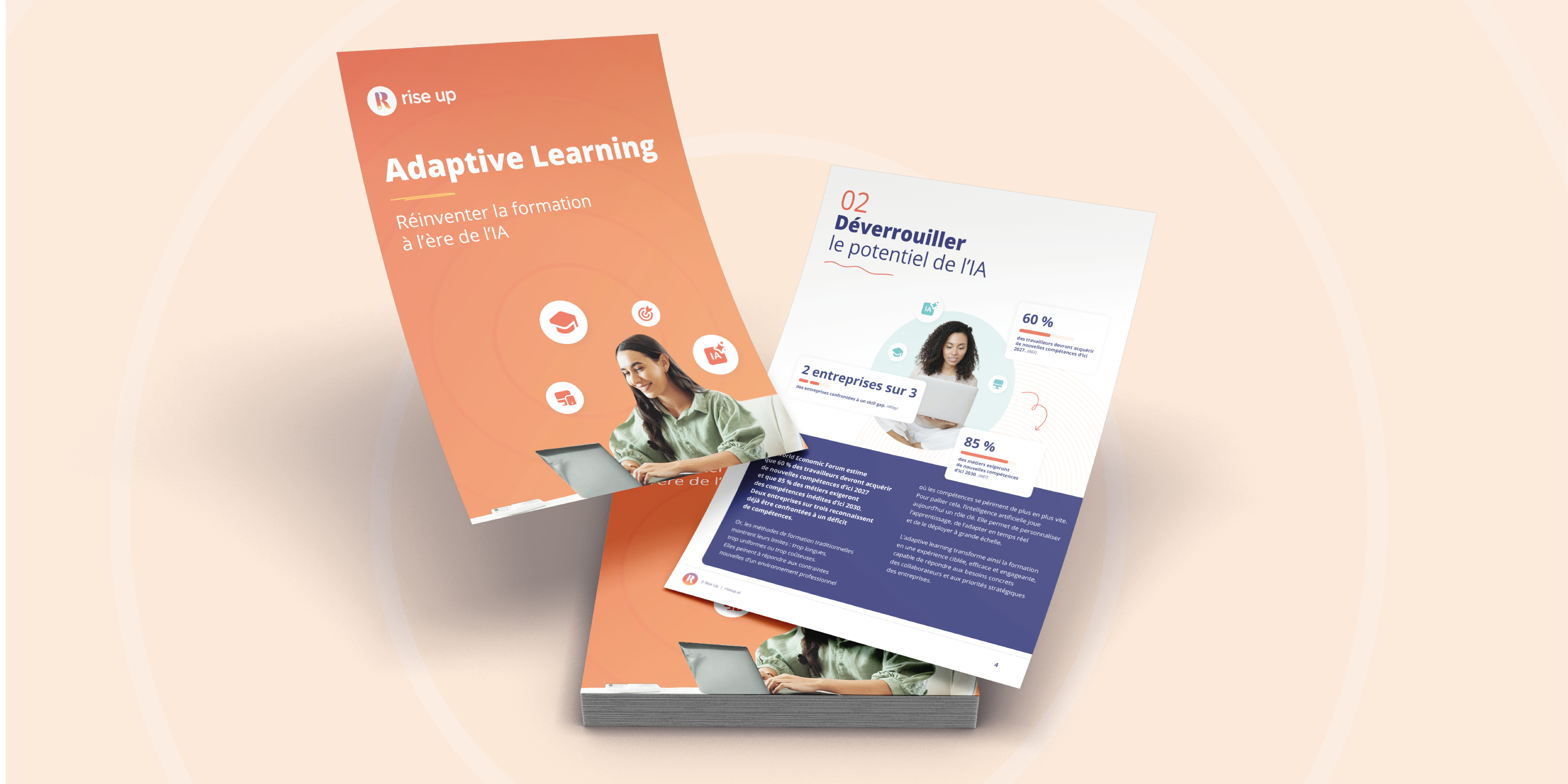
21 October 2025
The European leader is evolving its LMS platform by embedding Adaptive Learning at its core — delivering a smarter, more proactive, and personalized learning experience. Adaptive Learning is now natively integrated into the Rise Up platform, creating a seamless, continuous learning journey from initial assessment to skills mastery.

25 September 2025
Press Release - Paris, September 2025

03 July 2025
October 2023 — Rise Up, the LMS/LXP/Authoring Tool, has been awarded Accredited Learning Technologies Provider status by The Learning and Performance Institute (LPI) for the third year in a row. Rise Up has a longstanding strategic relationship with the LPI, and closely aligns its own mission with the commitment of the LPI for learning effectiveness. Rise Up was recently announced as the headline sponsor for the 2024 Learning Awards, taking place at the Grosvenor House in London on the 22nd of February. Jim Parish, who conducted the accreditation on behalf of the LPI, said: “Following our annual review, it is clear to see that Rise Up is passionate about their human-centered approach which underpins all their activity – from their design processes to their engagement with customers and also in their desire to drive forward adaptive learning to innovate in the way their product personalizes learning for the end user.’ “Rise Up is entering a period in which there are opportunities and challenges in maximizing the potential of the team to create further and greater business value. We congratulate Rise Up on achieving maximum scores in almost all areas and gaining the accreditation for the second year, having demonstrated their commitment to performance improvement.” The Year Three accreditation covers the learning solutions, products, and services provided by Rise Up to clients including learning platform products and learning consultancy services. The accreditation reviews the value proposition that Rise Up presents to its key stakeholders, and verifies that the organization is able, through its processes, workflow, resources, staff, and practices to deliver against that proposition.” Arnaud Blachon, CEO and Co-Founder of Rise Up added, “Here at Rise Up we value the renewal of our status of Accredited Learning Technologies Provider. This reflects our ongoing commitment to providing innovative learning solutions that truly help better the workplace and empower learners. We are on a mission to make learning in the flow of work achievable for businesses, and we’re proud to be recognized by the LPI for this.” Established in 2014, Rise Up is driving employee training and empowerment for brands across Europe, pursuing its regional expansion, with a recent €30 million in Series B financing. Today, its learning technology platform, combining LMS, LXP, and Authoring Tool across omnichannel and multimodal services, serves 1 million active learners in 73 countries and over 510 customers including AXA, Schneider Electric, Domino’s, Decathlon, and Sika. About Rise Up Founded in 2014, Rise Up empowers everyone to Own Today and helps organizations stay up-to-skill in real-time. Fuelled by tech, designed for people, and driven by performance, its LearningOpsTM framework drives organizational transformation and enables learning to work at business speed. Its learning software solution delivers a personalized learning experience for all stakeholders: trainers, administrators, and learners. Across all approaches, e-learning, face-to-face, and mobile, and in compliance with the regulatory framework, Rise Up is a full stack learning technology solution: LMS, LXP and Authoring Tool, omnichannel and multimodal service. For more information, please visit riseup.ai/en/
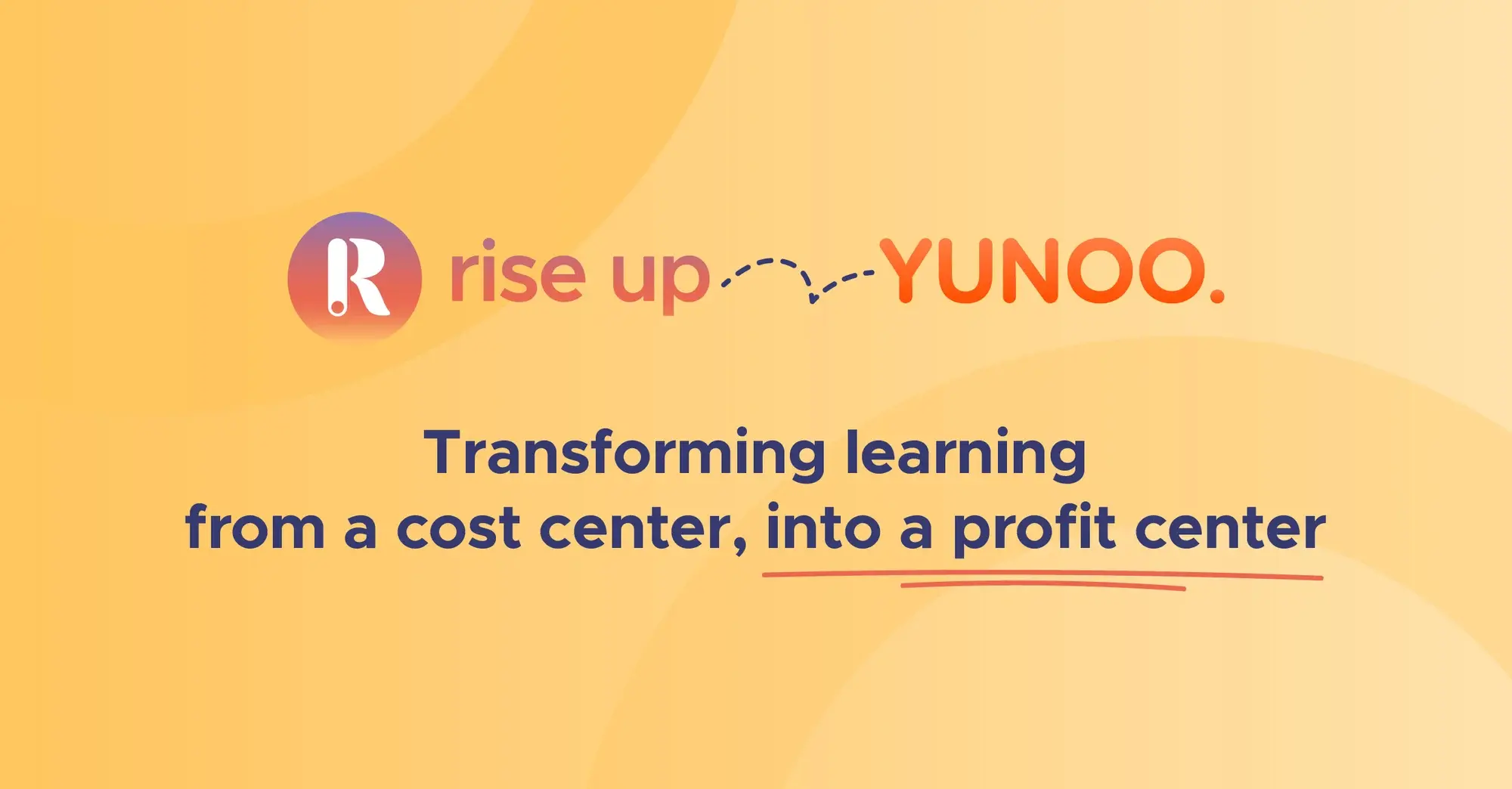
02 July 2025
Press Release - London, 18th November 2024 Transforming learning from a cost centre into a profit centre. Empowering thousands of organisations to place learning at the heart of their business success. Rise Up, the leading adaptive learning solution with over five million active users globally, has taken a bold step to transform training into a profitable venture by acquiring Yunoo, the instant e-commerce app for Learning Management Systems (LMS). This strategic acquisition enhances Rise Up’s all-in-one platform, with Yunoo acting as a bridge between learning management and commercial growth. Organisations now have the tools to transform learning content into a profitable asset, redefining training as a revenue generator rather than a cost centre. With Yunoo’s capabilities embedded seamlessly in the Rise Up LMS, companies can effortlessly monetise their training programmes, aligning business goals with learner engagement and growth opportunities. Arnaud Blachon, Co-Founder and CEO of Rise Up "When learning is a central business focus, tracking its impact on both engagement and revenue is critical. With the combined technical capabilities of both Rise Up and Yunoo, we are not only accelerating time-to-skill through hyper-personalisation but also giving companies a primary or secondary revenue stream that maximises their investment and ROI in learning. We are elevating the experience for our clients and partners, and I would like to thank our trusted advisors for their guidance through another successful acquisition" Many businesses and training providers struggle to profit from their courses, often needing multiple platforms to manage payments, course access, and user experiences. The integration of Yunoo now empowers organisations to streamline their course monetisation efforts, enhance customer relationships, and drive learner engagement all in one place. With real-time analytics that track both revenue and learning outcomes, businesses gain a clear picture of what works, making it easier to optimise for both impact and profitability. Transformative Features of Yunoo Key features of the Yunoo application that will transform learning into a profit-centre: Build your branded store in minutes: Set up and launch quickly with seamless integration. Monetise your training content: Launch a Customer Academy and reach new customers through a flexible and modern course catalogue with minimal effort. Track performance: Monitor your store’s success and learner engagement in real-time for data-driven decisions. Optimise customer experience: Manage sales, customer journeys, and learning all in one place. David Geismar, founder and CEO of Yunoo "Joining Rise Up marks an exciting new chapter for everyone at Yunoo. Together, we’re enabling organisations to unlock the true potential of learning by generating digital storefronts that capitalise on Rise Up’s powerful learning platform. As we come on board with Rise Up, we are thrilled to bring our expertise to this partnership, helping organisations extend their reach and impact through innovative, accessible, and scalable training solutions." Blachon added: “The L&D industry is fast evolving, and we have our sights set on maintaining our frontrunner status in the market. We look forward to building on previous successes and being part of the change the sector is yet to see.” Yunoo will be available exclusively through Rise Up for new customers, while current users will be able to retain their existing LMS platform to ensure continuity of service. For more information visit the Rise Up website here. About Rise Up Founded in 2014, Rise Up has become a leading professional learning platform that transforms the learning experience for trainers, administrators, and learners alike. Offering a comprehensive and unique solution across various learning approaches — e-learning, face-to-face, and mobile — Rise Up ensures compliance with regulatory frameworks. The platform encompasses a range of services including LMS, LXP, LRS, LCMS, as well as mobile and multimodal services. Having raised a total of 35 million euros in equity investment, Rise Up has secured support from top-tier investors such as Connected Capital, MAIF Avenir, and IMPACT Partners. Since its inception, the company has experienced exponential growth, doubling both its sales and headcount annually. Today, Rise Up boasts a team of over 100 employees across seven key European countries. The company serves more than 5 million active learners in 73 countries, partnering with over 500 prestigious customers including AXA, Schneider Electric, Domino's, Decathlon, and Sika, among others. With plans to further expand across Europe, Rise Up continues to strengthen its global and local teams to meet growing demand and maintain its rapid growth trajectory. For more information, visit www.riseup.ai.

29 April 2025
"With this acquisition, the future of personalisation is here, and it's adaptive."

29 April 2025
In a context where rapid skills adaptation has become a strategic lever, professional training can no longer afford to be approximate. Companies are investing heavily in time, tools and human resources to support their employees — but with what return? The real question is no longer ‘should we train?’, but ‘how can we measure the real impact of training on performance?’ This article explores why and how to effectively evaluate your training programmes, using key indicators such as Time-to-Skill. The goal is to help you transform your L&D programmes into real accelerators of skills and business results.

25 April 2025
As the demands of companies and customers are constantly changing, the ability of an organisation to train its employees quickly is a key factor in competitiveness. There are several indicators for assessing this ability, one of which stands out in particular for its effectiveness: Time-to-Skill.

14 March 2025
In a constantly changing world of work, training is an essential strategic lever for companies. It enables companies and individuals to keep up to date with technological and societal developments, but also to overcome skills shortages and support the transformation of organisations.

10 March 2025
In a constantly changing world of work, the role of L&D Managers is becoming crucial in the adaptation and reinforcement of employees' skills. However, vocational training is still too often perceived as an administrative obligation rather than a strategic lever. To reposition training as a real strategic asset, it is essential to align it with the company's objectives and demonstrate its impact through measurable performance indicators. In this blog, we share 6 tips on how to enhance your training offer, improve its impact, and guarantee stronger learning.

05 March 2025
Press Release - London, 5th March 2025

28 February 2025
Press Release - London, 28th January 2025
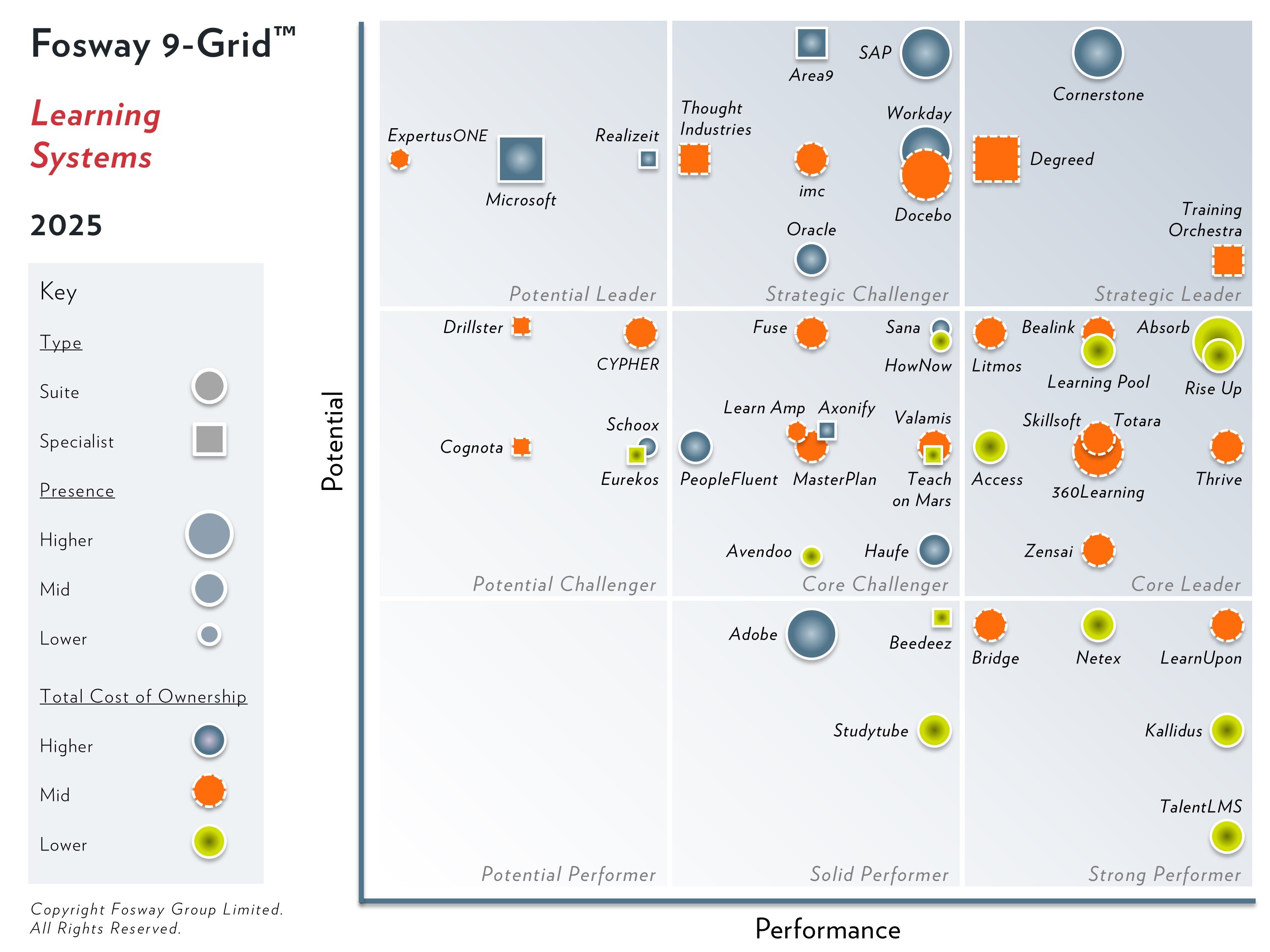
26 February 2025
Press Release - London, 26th February 2025

03 February 2025
Press Release - London, 3rd February 2025
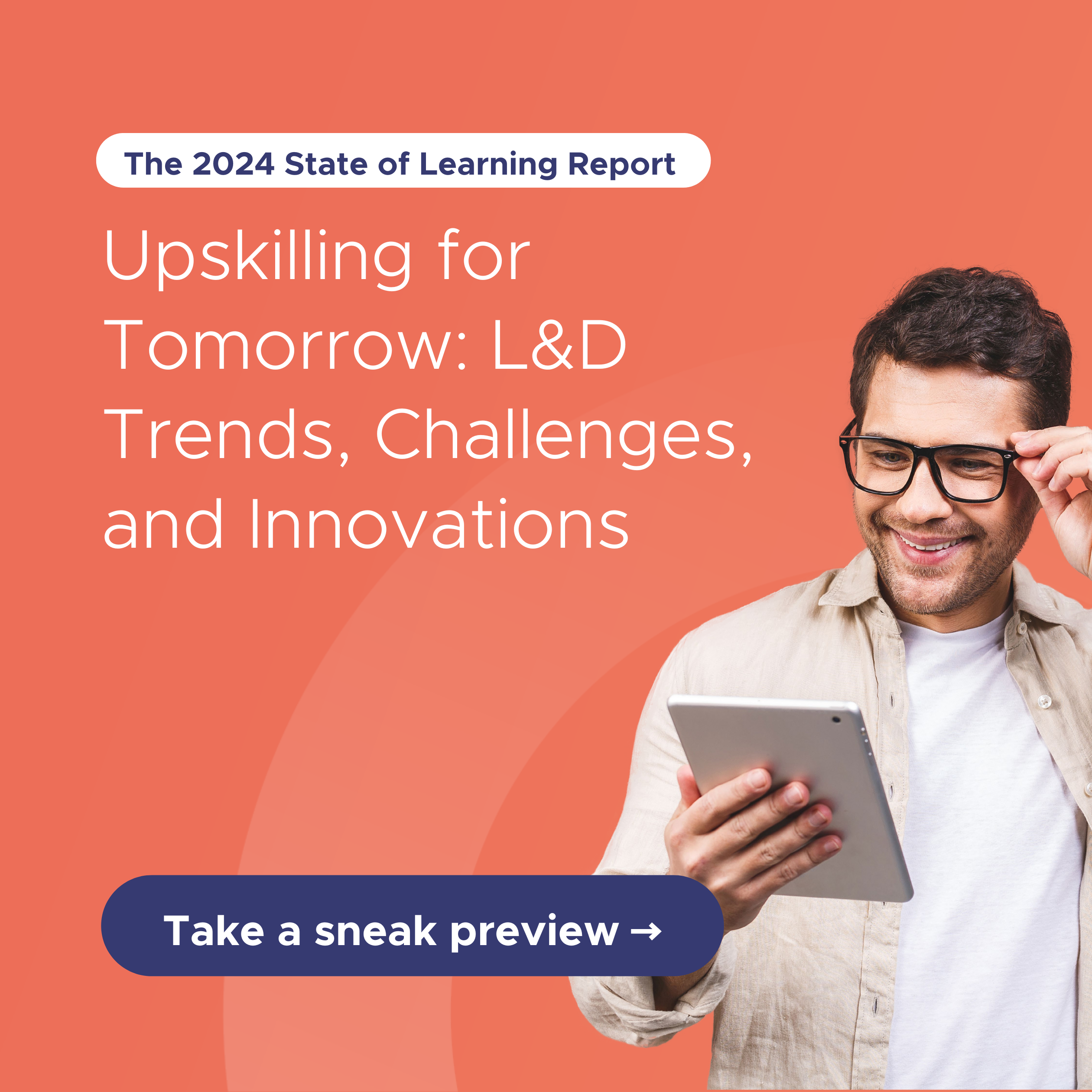
25 September 2024
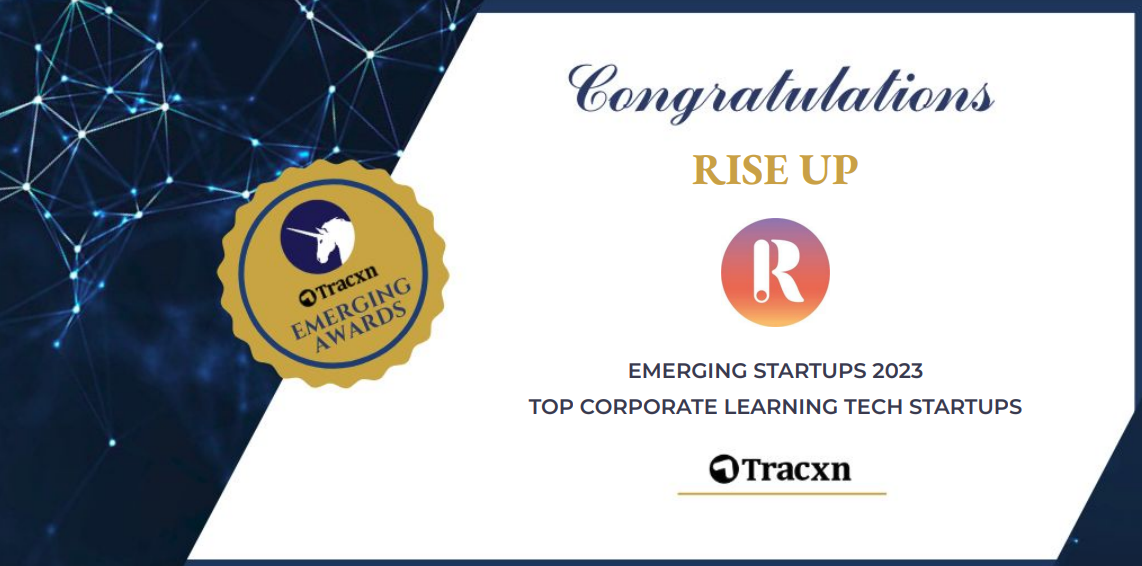
24 January 2024
August 2023 – blended learning platform provider Rise Up has been recognized in market research platform Tracxn’s Emerging Startups of Corporate Learning list. This Emerging Award series recognizes the topmost companies in Corporate Learning from across the globe. Rise Up has been showcased as a “Minicorn”; a company that has the potential to grow into a Unicorn and is amongst the leading tech startups of Corporate Learning. This follows Rise Up rising in the Fosway 9-Grid for Learning Systems as a recognized Core Challenger.

16 November 2023
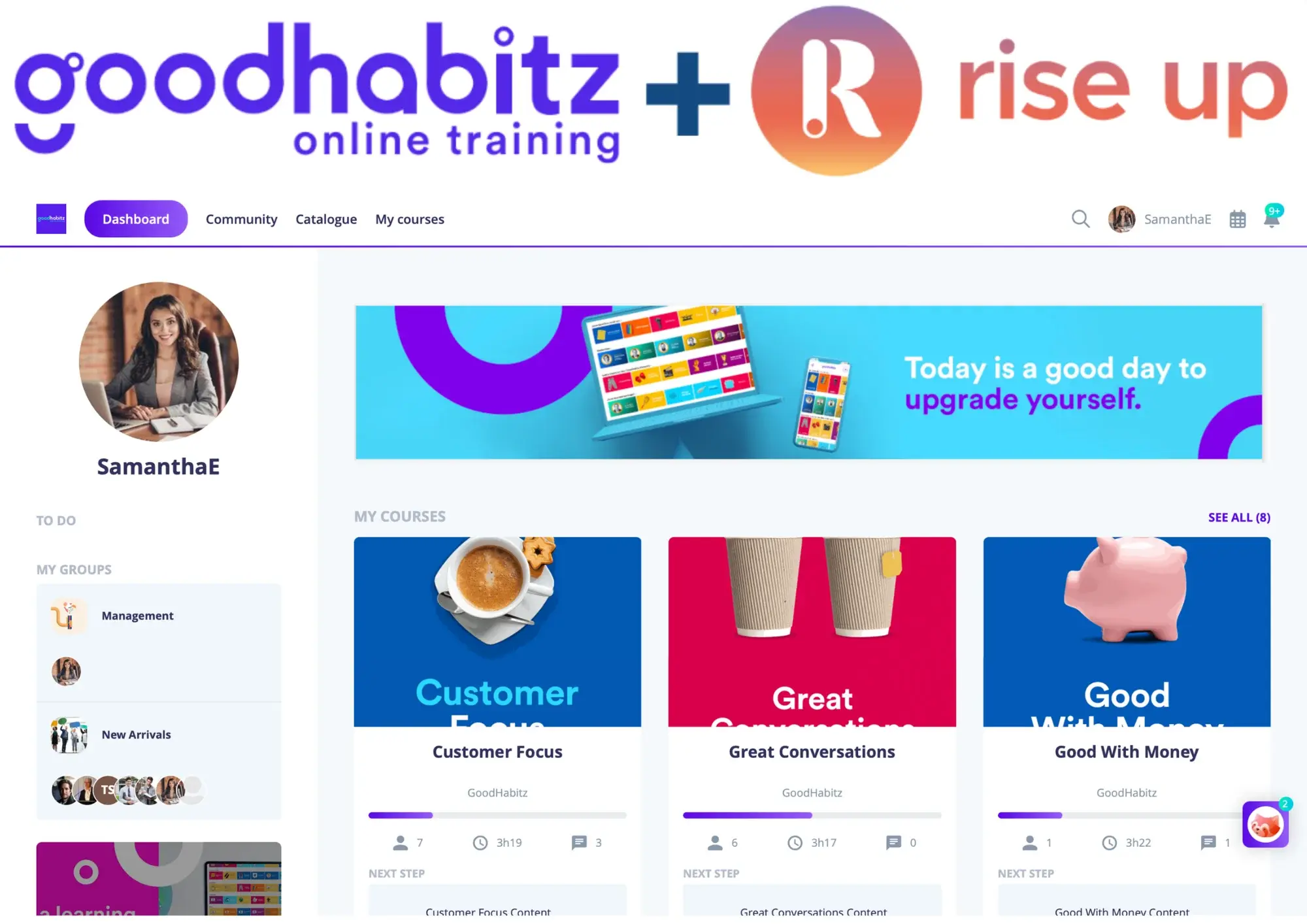
24 October 2023
GoodHabitz who creates online learning solutions with unique and snackable educational content and Rise Up, Fosway’s accelerating Core Challenger for Learning Systems, announce today their partnership to enhance the corporate learning experience for organizations and their employees. This partnership provides Rise Up customers with seamless access to GoodHabitz's comprehensive content library, covering a wide range of skills, including personal strength, health and well-being, digital skills, language, communication, Microsoft Office, inspirational leadership, management, teamwork, and commercial skills. Both companies strongly believe that a personalized learning experience is key to increasing learner engagement. That is why GoodHabitz is offering more than 25 learning styles and over 19 languages. When asked about the partnership the leaders had this to say: “We decided to work closely with Rise Up, because we share the vision to increase learner motivation and engagement with great content and technology. By combining our award-winning content with Rise Up’s innovative SaaS platform, we not only create an easy-to-use solution for L&D Mangers but foremostly make sure that the learner has a seamless learning experience. GoodHabitz’s coaching solution and Rise Ups’s L&D Methodology helps to nurture companies learning cultures.”, says Sabine Schnorr, Partnerships Director at GoodHabitz. The collaboration is a significant milestone for both parties, and it demonstrates their commitment to creating a culture of learning in the workplace. Through this partnership, Rise Up and GoodHabitz are poised to bring about positive changes in organizations worldwide, empowering employees to acquire new skills and improve their performance. "We are proud to partner with GoodHabitz and to bring their engaging and insightful content to our platform," said Arnaud Blachon, CEO of Rise Up. "It is important for us to be able to provide customers with the full solution. Our collaboration will help companies foster a culture of learning through our LearningOps programs and their coaches support, making it easier for their employees to access high-quality content and develop essential skills that are crucial for their professional growth." About Good Habitz GoodHabitz, founded in 2011 in the Netherlands, is a leading European provider of E-Learning solutions. By offering engaging and fun online courses, from soft skills to digital skills and languages, GoodHabitz contributes to the personal development of every employee. Various engaging learning formats make sure that the content is accessible and enjoyable for everyone. Coaches help to establish learning cultures in the organisation and all that for one fixed price. Currently, more than 2,500 companies, like Puma, ADAC or DEKRA upgrade their workforce with GoodHabitz. More than 400 employees are working for GoodHabitz in offices all over the world. About Rise Up Established in 2014, Rise Up is driving employee training and empowerment for brands across Europe, pursuing its regional expansion, with a recent €30 million in Series B financing. Today, its learning technology platform, combining LMS, LXP, and Authoring Tool across omnichannel and multimodal services, serves 1 million active learners in 73 countries and over 510 customers including AXA, Schneider Electric, Domino’s, Decathlon, and Sika. Across all approaches, e-learning, face-to-face and mobile, Rise Up empowers everyone to Own Today and helps organizations stay up-to-skill in real time. Fuelled by tech, designed for people, and driven by performance, its LearningOpsTM framework drives organizational transformation and enables learning to work at business speed. Its learning software solution delivers a personalized learning experience for all stakeholders: trainers, administrators, and learners. For more information, please visit www.riseup.ai/en Press coverage: FE News Learning News Interlligent CXO

18 October 2023
The World of Learning event in October 2023 was a pivotal gathering of learning professionals, and experts looking for answers on the ever-pressing issue - the frustration surrounding the inability to present a Return on Investment (ROI) for learning initiatives.

18 October 2023
According to the Fosway Group's Digital Learning Realities 2023 study, which CEO of Fosway, David Wilson shared during the Rise Up Connect 2023 event, 49% of Learning & Development (L&D) professionals believe that their current programs are ill-suited for the modern workforce. In simpler terms, most employees lack access to innovative training platforms necessary for skill development. Plus, digital learning fatigue is increasingly affecting learners, with a third of L&D professionals identifying it as a concern. Here is where AI can help. The integration of AI into businesses’ learning strategies ushers in a new era, expanding possibilities in teaching strategies, content creation, and learner engagement. Below is a recap of the Rise Up Connect 2023 event, which sheds light on AI's contribution to skills development. Jasmine Silver, a researcher and specialist in Education and Psychology, as well as David Wilson, CEO and founder of the Fosway Group, provided crucial insights. Improving the Learning Experience L&D teams’ aim is for employees to find meaning in their learning journey and enjoy a seamless progression, enabling them to acquire the technical and soft skills they need quickly and effectively. According to David Wilson, organizations' short-term priorities for learning experiences revolve around two primary aspects: To strengthen the connection with skills. To integrate this experience into a career development strategy. What's evident is the shift towards skills-based professional training. A survey conducted by Deloitte (Skills-Based Organization Survey 2022) reveals that 77% of business leaders consider adapting skills at work as essential to navigate future market changes and innovations. Yet only 5% of them invest adequately in helping employees acquire new skills to stay current. AI plays a pivotal role here, as 61% of business leaders believe that new technologies like automation and AI will be the primary drivers of adopting a skills-based approach within their organizations. The Potential Impact of AI on Professional Training The immediate impact of employing an AI system is most visible in services related to delivering learning content and designing training programs. David Wilson explains that AI expedites and simplifies: Content aggregation and curation: Centralizing educational content from various internet sources onto a single training platform. Compilation of content for creating a diverse training catalog. Developing learning resources and training modules using authoring tools. In the medium term, AI's deployment primarily affects professional training at the technical and technological level, including learning systems and software solutions. In the long term, AI's impact is assessed on a broader scale: transforming learning, refining strategies, and achieving better performance. Challenges in Professional Training Jasmine Silver highlights the limitations of current professional training, including a lack of engagement and practice, and poor knowledge retention. She also demonstrates how AI helps organizations overcome these challenges. Lack of Learner Engagement In a rapidly changing professional landscape influenced by new technologies, employees face the ongoing necessity of updating their skills. However, obstacles to learner engagement are very real. Firstly, there is the issue of time, with employees having an average of only 24 minutes per week for training. Additionally, they juggle multiple business applications (an average of 9). This means employees fail to remember much of the knowledge and skills acquired during their training in the long term. Consequently, employees often lack engagement, exhibit inconsistent attention, and fail to fully benefit from their training sessions. Implementing techniques aimed at overcoming the "forgetting curve" and reinforcing memory anchors is crucial to ensure effective skill enhancement. Lack of Practice Translating acquired knowledge into professional practice is a significant challenge for learners. Even if they complete training courses, validate content, and commit information to memory, they often struggle with practical applications. Implementing new technical skills within simulations replicating real workplace challenges is essential for gaining efficiency and improving performance. How Will AI Enhance the Learning Process? Jasmine Silver emphasizes the benefits of AI in learning with the personalization of courses, improved learner support, the introduction of complementary teaching methods, and AI's ability to create immersive experiences. For example, Rise Up’s AI capabilities perform automatic content selection to present training that directly benefits the employee. This personalization extends to the evaluation process, replacing general quizzes with questions tailored to the employee's professional context. AI also enhances learner support and motivation by providing instant, precise, and detailed feedback. Personalized evaluations yield more relevant feedback, and learners can easily monitor their progress through an individual dashboard on the training platform, fostering a greater sense of accomplishment. Promoting Learning through Knowledge Reinforcement Simply passing the final evaluation of a training course does not guarantee long-term retention of technical skills and knowledge. Linear learning, without revisiting previously acquired knowledge, often results in forgetting key information. AI offers valuable assistance in mitigating this phenomenon. AI supports memory anchoring through key learning techniques: Spaced repetition: Exposure to new knowledge multiple times is essential for assimilation. The virtual coach provides short review sessions regularly, well after the training ends. Retrieval practice: Simply reviewing is insufficient; retraining is crucial. AI offers quizzes tailored to the content learned and the employee's daily context. Elaborative learning: This involves deepening the understanding of content by establishing connections between recent knowledge, professional tasks, and previously acquired concepts. These "bridges" enrich and anchor knowledge effectively. Working on an Immersive Experience AI aims to ensure the practical application of theoretical concepts through immersive experiences that closely mimic real professional scenarios. AI is capable of generating simulations that replicate employees' activities by aggregating a wide array of case studies relevant to their challenges. Learners can practice these simulations as often as needed until they achieve mastery of the targeted technical or soft skills. Furthermore, AI assists employees in setting learning objectives and translating acquired knowledge into concrete actions in their daily work, thereby integrating training seamlessly into their routines. Getting Started with AI in Your Learning Strategies with Rise Up Rise Up is at the forefront of the AI revolution. Our LXP/LMS solution harnesses Generative AI to accelerate the development of professional training systems, optimize learning, and enhance the learner experience. AI is involved from the training's design phase; automatically generating content our authoring tool can offer learning resources and assessment content with a simple entry of the training title. Rise Up also aids in creating visuals, translating training into 22 languages, and automatically tagging associated skills. Already have a set of learning content (text, videos, etc.)? Great! Importing them into the Rise Up solution can transform them into high-quality training modules, incorporating innovative teaching methods and interactive elements. Beyond this, AI enhances the overall course design by automatically combining modules to provide a better context for learners. Learners, in turn, benefit from an enriched learning experience and accelerated skills development. With a few clicks, they access content tailored to their specific needs. Generative AI uses the learner's profile and training history to select resources directly useful to them. It’s time to join the revolution! Learn more here. Download our AI guide here.
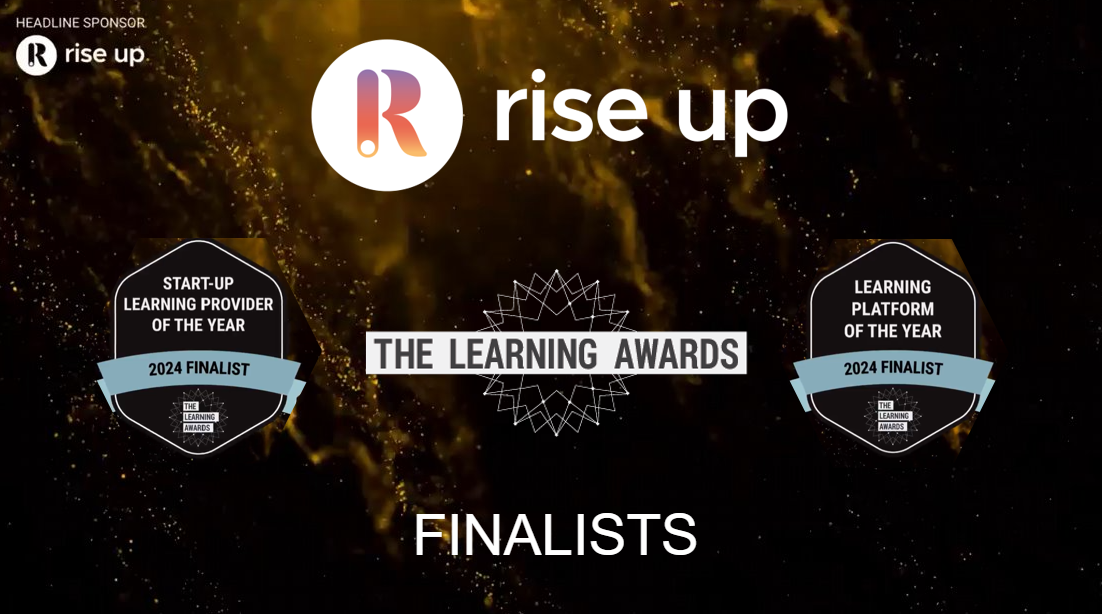
09 October 2023
October 2023 - Blended learning provider Rise Up has been shortlisted in two categories in the LPI (Learning and Performance Institute)’s 2024 Learning Awards, the learning sector’s annual celebration of outstanding achievement, best practice, and excellence in workplace learning and performance.

04 October 2023
Rise Up is an accredited LPI Technology Vendor, meaning we were invited to the digital forum, and it was a privilege to gain insights from Daniela Landherr during her interview with Andy Lopata, Psychology Today's journalist. Daniela, the former head of talent development at Google, who now works as a coach, shared a wealth of wisdom on creating a learning culture and the importance of embracing the era of AI.

18 September 2023

18 September 2023

31 August 2023
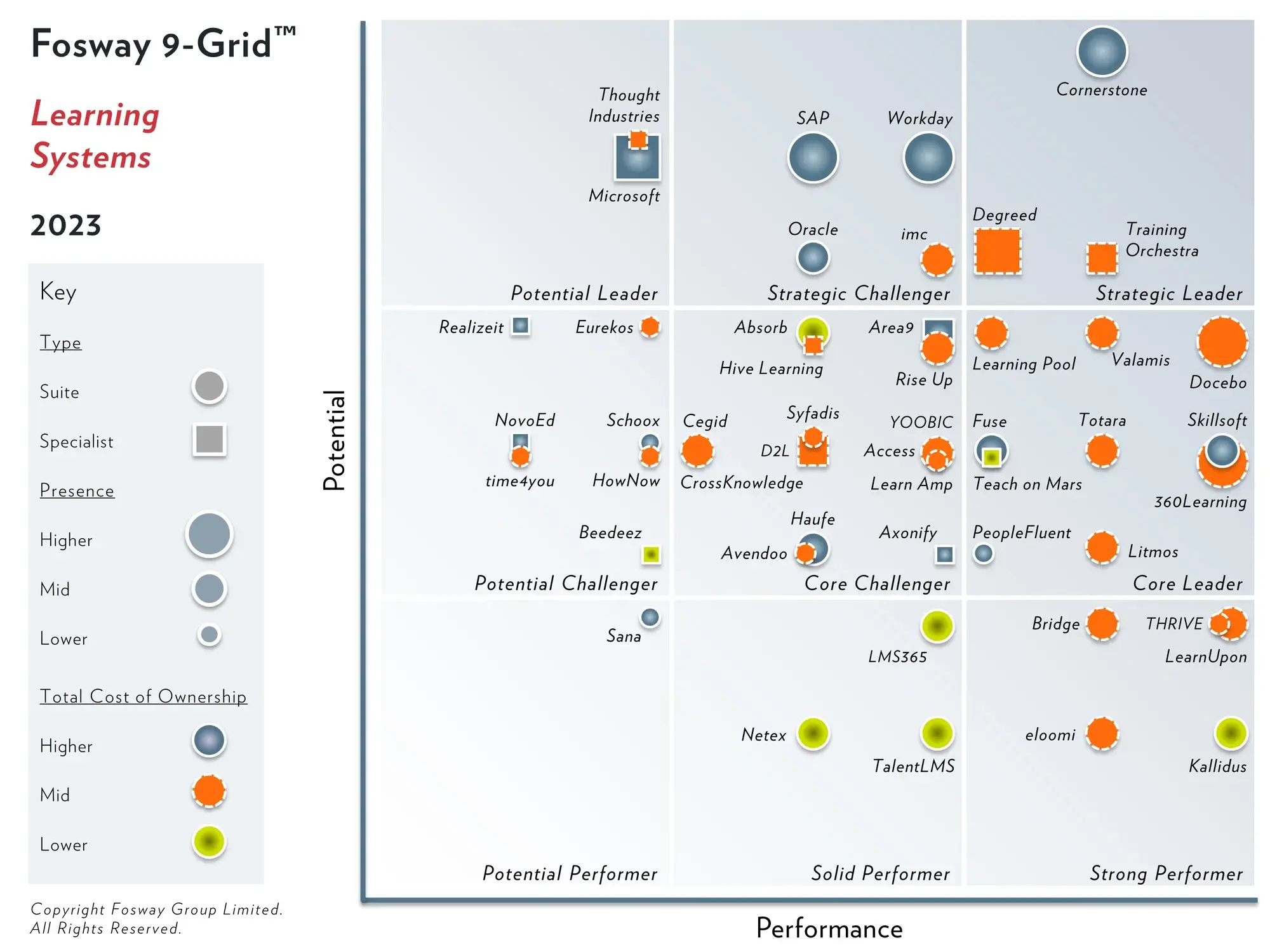
16 August 2023
London, United Kingdom, 1 February 2023 — Rise Up, the blended learning platform is thrilled to announce its improved position as a Core Challenger in the 2023 Fosway 9-Grid™ for Learning Systems for the second consecutive year. This recognition of acceleration is based on the Rise Up platform’s solid performance and growth potential as user adoption expands across Europe. What is the Fosway 9-Grid™ for Learning Systems? The Fosway 9-Grid™, curated by the renowned EMEA HR industry analyst Fosway Group, offers a comprehensive overview of the learning systems market for EMEA corporate buyers, guiding organizations to make informed decisions about the solutions that align with their unique needs. The Grid is the only European-centric research and analysis based on five critical factors; Performance, Potential, Market Presence, Total Cost of Ownership, and Future Trajectories. “The 2023 Fosway 9-Grid™ for Learning Systems report shows that the market is transforming rapidly as traditional learning makes way for digital innovation,” said David Wilson, CEO, Fosway Group." Rise Up continues to grow its customer base across Europe through product innovation and the deepening of its functional capability."
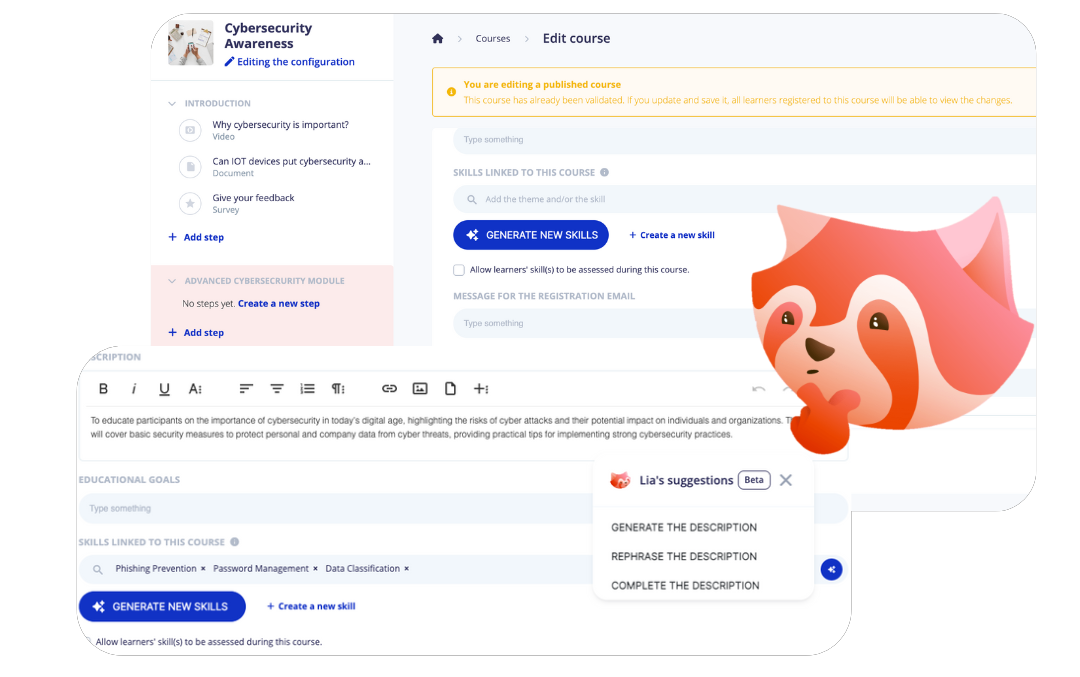
20 July 2023
Rise Up, the LPI and Fosway recognized blended learning platform, has released new cutting-edge functionality to its LMS/LXP, including a native generative AI bot LIA, to expand their authoring tool by enabling users to create learning content three times faster and a lot more interactive/engaging.

12 July 2023
"What the steam engine did for mechanizing labor, AI will do for intellectual work."

05 July 2023
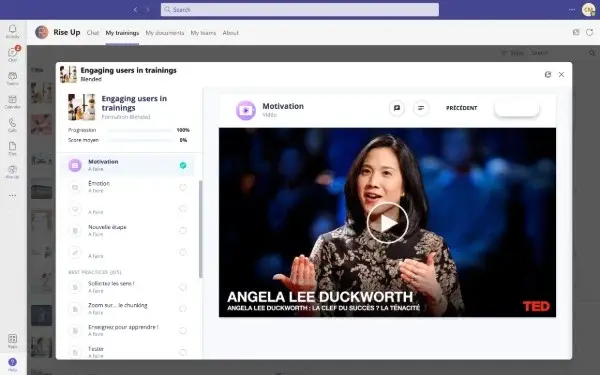
15 June 2023
15th June 2023 - Rise Up, the fast-growing employee learning software solution, is delivering a new Microsoft Teams app to help upskill employees with a personalized solution using artificial intelligence. Making training part of employees' routines gives each learner direct access to their training, at any time, from any device, without leaving their daily work environment.
.jpg)
05 June 2023
Learning and Development is central to the quiet hiring approach to talent management according the experts at Gartner’s latest UK Digital Workplace Summit.

05 June 2023
Top tips for L&D professionals to from Gartner’s latest UK Digital Workplace Summit.

31 May 2023
Camilia Miccolis Leader of UKI & Netherlands at Rise Up, discusses how we can reduce work-related stress in the finance sector through learning and development strategies.

31 May 2023

31 May 2023

22 May 2023
Key points from our discussion session at the Learning Technologies 2023 conference.

22 May 2023
Camilia Miccolis, Country Director UK and Netherlands at Rise Up looks at why purpose in the workplace is a driving factor for Gen Zs and the role learning and development plays

17 May 2023
The need for L&D to adapt to a hybrid workforce was a key theme at the 2023 Learning Technologies conference in London.
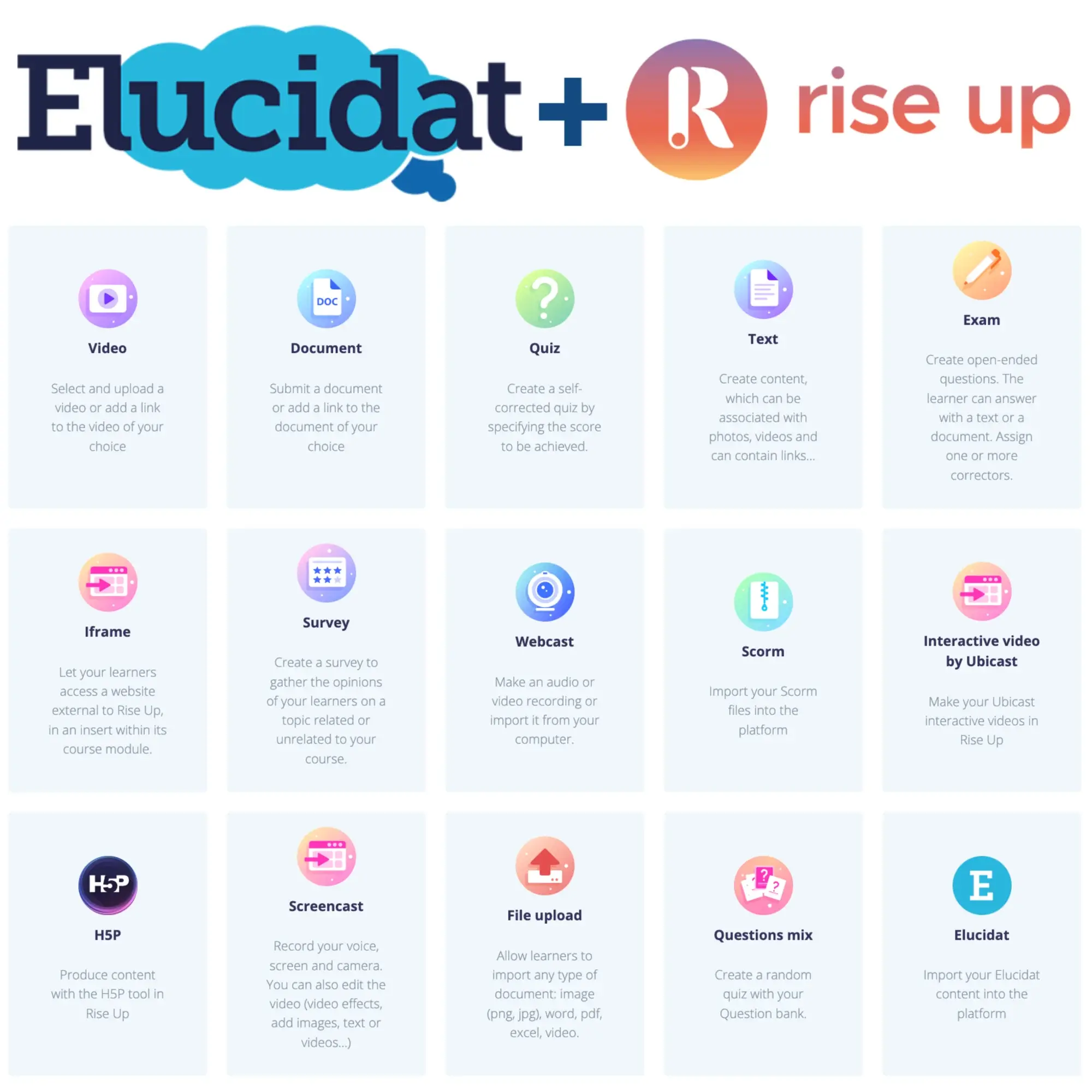
10 May 2023
London, UK – May 2023 – Elucidat, the globally recognized elearning authoring platform, has partnered with Rise Up, a forward-thinking LXP/LMS, to bring cutting-edge learning experiences to businesses. This collaboration will offer an integration of Elucidat's leading authoring platform into Rise Up's LXP/LMS to enable organizations to take their content creation to the next level. By integrating Elucidat's eLearning authoring solution into Rise Up's LXP/LMS, organizations can unlock the power to streamline content production and delivery, resulting in a more efficient and cost-effective solution. With this combined solution, anyone can easily share their expertise and create impactful elearning content across various modules.

26 April 2023

24 April 2023
Arnaud Blachon, Chief Executive Officer & Co-Founder at Rise Up, discusses how learning and development strategies can help reduce work-related stress
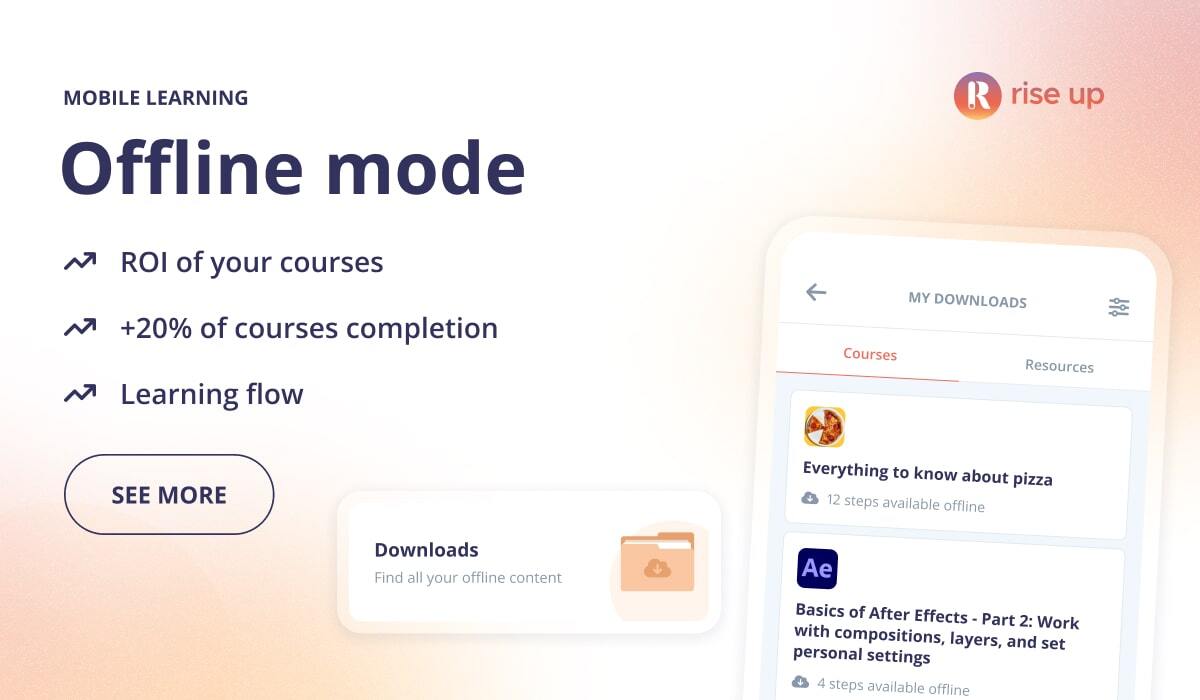
04 April 2023

30 March 2023
Does your L&D program actively add value? Does it drive business performance? Is it a source of competitive advantage … or just a cost center?

13 March 2023
Mental health costs UK employers £56 billion each year (Deloitte). At any one time, one in six of Britain’s working-age population experiences symptoms associated with mental health (Royal College of Psychiatrists), and half of the employees have experienced at least one characteristic of burnout (Deloitte).

07 March 2023
Learner disengagement is one of the biggest challenges facing training organizations. Sometimes it’s obvious in dropout rates, but sometimes it’s hidden in poor outcomes. The learners attended, but they failed to learn.

07 March 2023
How to flex to 2023’s way of working In recent years, requirements of training providers have shifted with many factors impacting when, where and how training delivery can be enhanced. As Gartner reports: “52% of employees say flexible work policies will affect their decision to stay at their organizations.” (Gartner, 2023) With changing priorities and a more diverse workforce, how can providers ensure everyone is supported?

04 March 2023
One of the main challenges of corporate training is creating relevant and engaging learning paths, and ensuring that learners retain the information in the long term. This is not only for compliance reasons but also to give your employees the tools to perform better on a daily basis. But how do you maintain knowledge over time and guarantee the effectiveness of the training given?

24 February 2023
As employee engagement is declining and our skills gap crisis deepens, finding effective methods of connecting with learners is a core challenge for 2023. Gallup’s latest research found that only 34% of the over 57,000 employees they surveyed felt engaged at work, and 16% confirmed they were actively disengaged. Creating learning programs and shifting the workplace mindset towards tangible business outcomes is vital for retention and engagement to help you mitigate the risk. PwC found that 20% of employees will switch jobs within the year.

22 December 2022
In our previous blog, we explored how the post-covid era has led to various challenges for HR professionals. In this article, we tackle the skills HR teams need today to help fight these.

13 December 2022
Rise Up teamed up with the industry magazine People Management to produce a report on Solving the skills shortage with L&D. The whitepaper looks at the current employee landscape and outlines the very important role Learning and Development and HR teams can play in addressing the skills crisis. This article will outline a preview of our insights. You can download the full guide here.

12 December 2022
Rise Up, the employee learning software solution provider has promoted Camilia Miccolis to Director of UKI and Netherlands. Miccolis will be responsible for leading business growth across the region, including strategy, sales, marketing, partnerships, management, and performance. Rise Up Co-Founder & Chief Executive Officer Arnaud Blachon explains, “With the appointment of Camilia, we are taking a new approach to the UK market by choosing a leader who knows Rise Up better than any outsider. Following her success in leading the Benelux team, we are confident Camilia will help us drive success in the UKI and Netherlands, important markets for our European expansion." Miccolis adds, “I’ve seen the tremendous impact Rise Up has delivered for customers in Benelux and I’m focused on building synergies and success for our English-speaking customers. We are here to help UK, Irish and Dutch organizations stay up-to-skill every day by delivering training at business speed.” Miccolis started at Rise Up in 2019 in business development for both Luxembourg and France. Both French and Brazilian, Miccolis was born and raised in the United States. After graduating from Northeastern University in Boston, where she interned at Puma and Intralinks, she began a full-time job at IoT tech company Spiria. She then moved to Madrid to learn Spanish and work as an English teacher, prior to moving to Paris and joining Rise Up. With a location in London, King’s Cross, Rise Up opened its office in the UK in 2021, achieving membership with the LPI and debuted on Fosway’s Learning Systems grid as a Core Challenger. With a rapidly growing team, Rise Up drives employee training and empowerment for various British brands such as training provider Red Driving School and NHS. The NHS team recently received this year's Silver Award for Excellence in the design of learning content at the #LT22Awards during Learning Technologies, thanks to the help of Rise Up. After two years in the Netherlands, Rise Up has an office in Amsterdam with a growing Dutch customer base including Eneco and Bunq. In May 2022, Rise Up raised €30 million in Series B financing, and the company is pursuing its expansion across Europe. Today, its learning technology platform, combining LMS, LXP, and Authoring Tool across omnichannel and multimodal services, serves 1 million active learners in 73 countries and over 510 customers including AXA, Schneider Electric, Domino’s, NHS, Decathlon, and Sika. About Rise Up Founded in 2014, Rise Up empowers everyone to Own Today and helps organizations stay up-to-skill in real-time. Fueled by tech, designed for people and driven by performance, their LearningOpsTM framework drives organizational transformation and enables learning to work at business speed. Its learning software solution delivers a personalized learning experience for all stakeholders: trainers, administrators, and learners. Across all approaches, e-learning, face-to-face, and mobile, and in compliance with the regulatory framework, Rise Up is a full stack learning technology solution: LMS, LXP and Authoring Tool, omnichannel and multimodal service. Growing quickly, Rise Up counts over 100 employees today in six key countries across Europe, serving over 1 million active learners in 73 countries and 22 languages and over 510 customers, including Axa, Schneider Electric, Domino’s, NHS, Red Driving School, UGW, SIKA, and SettleMint. For more information, please visit www.riseup.ai. Contact media@riseup.ai
-1.jpg)
02 December 2022
Training managers know that capturing learners' attention and keeping them engaged are the keys to successful training. Interactive training also helps to keep the individual in the workflow, i.e., to keep their concentration at a high level. The flow represents the optimal balance between the simplicity and complexity of the training: content aligned with the learner's abilities and needs combined with subtle interactivity optimizes their involvement.

21 November 2022
Both verbal and non-verbal communication are equally important. Whether it is the words spoken, an attitude, or a certain look, they all greatly influence how we work with others. How can we decode verbal and non-verbal elements to communicate better in business? Let's dive into how verbal and non-verbal communication are essential soft skills to learn.

14 November 2022
A professional skills assessment is a key tool for businesses looking to develop, grow and retain their personnel On top of helping employees' career progression, measuring skill levels means shining a light on a workforce's strengths and weaknesses, and therefore a company's ability to perform in the market.

07 November 2022
HR has seen some profound shifts in recent years. Human resources professionals have been on the front line since the first months of the health crisis, and their central role within organizations is sure to continue. HR departments face the consequences of lockdowns and restrictions: the implementation of a new approach to work in an organization (remote working, hybrid work).

07 November 2022
The value of an employee lies in their professional skills. By skills, we of course mean technical and business skills (hard skills), but not only that - an employee's skills and abilities cover a much wider field.

04 November 2022
Developing our interpersonal skills is essential in the current (and future) work environment. Creativity, leadership, adaptability and autonomy are qualities increasingly sought-after by employers. Interpersonal skills determine well-being at work, career development and the success of the company as a whole. Rise Up zooms in on interpersonal skills and gives you solutions on how to improve them.

27 October 2022
Learning new skills is essential for all employees, whatever their career objectives: changing company, strengthening their expertise, moving to a managerial position, retraining... Professions and jobs are evolving, so this means employees must continuously develop new skills and knowledge and enter uncharted territories. The digitalisation of work is a major underlying trend, with the omnipresence of digital technology and the advance of artificial intelligence.
-1.webp)
25 October 2022
Rise Up, the fast-growing European employee learning software solution, unveiled its new Own Today purpose alongside a new framework to drive organizational transformation and enable learning to work at business speed: LearningOpsTM. Rise Up empowers every team member to do their best work every day and offers organizations a new way to stay up-to-skill each day. Today, learning is one of the most fundamental business challenges and is top of mind for both CEOs and employees. However, 70% of employees have not mastered the skills they need for their jobs today*. Being future-ready, therefore, requires solving the Skills Gap today.

19 October 2022
Keeping abreast of the latest innovations in the world of EdTech, a practice increasingly used for workplace learning came up: User-Generated Content. UGC for short, is a principle that encourages employees to create their own educational content so that it can be reused as part of the company’s Learning & Development plan.

18 October 2022
The integration of hybrid work in companies is no longer an isolated phenomenon, reserved for certain "pioneering" organisations. Now, hybrid work is becoming the norm. However, according to a survey by Sapio Research and workplace platform provider Envoy, most UK workers prefer to spend some time in the office with 57% opting for a hybrid work model. Meanwhile, 38% indicated they preferred to work at the office full-time, and only 5% would like to work remotely all the time.
.webp)
18 October 2022
Every employee has surely experienced the frustration of time-consuming meetings that don't achieve anything constructive. Increasingly viewed as a bad example of collaborative work, employees find their interest wanes, and they become more passive.

18 October 2022
Work emails can be a real bugbear for employees. All employees know what it's like to face a daily barrage of emails, or even worse, returning from a holiday to a deluge of emails. An average of 88 emails are received every day in work according to a survey carried out by research firm Radicati Group . Executives appear to be particularly sought-after: according to an Adobe study, they spend more than half their day checking their email (5 hours on average)!

03 October 2022
More than 300 Learning & Development leaders gathered to participate in the annual Rise Up Connect 2022 event and explored two themes that are essential to the Learning & Development industry: transformation and personalization. Together, they made this edition memorable.

27 September 2022
Are managers becoming obsolete? While this might sound like an absurd question, it’s one that many experts are asking. According to the management consulting firm Gartner, 30% of employees will be without a boss by 2024 due to the self-directed and hybrid nature of work.

27 September 2022
Interpersonal communication is an essential aspect of any business. Impeccable communication can help team members and managers to ensure the seamless exchange of information, promote a stimulating and motivating environment, foster cohesion and boost team performance. While these might sound like unattainable ambitions, they can all be achieved through the use of specific interpersonal communication techniques. What’s more, training can help employees to develop and refine these sorts of skills.

27 September 2022
According to a study conducted by leading global employment website Monster, 90% of employers believe that soft skills will become more important over the next few years. But why?

27 September 2022
When we talk about skills, the main distinction that people make tends to be between hard skills and soft skills. The difference between the two seems fairly straightforward: hard skills are the technical skills required to perform a role, whereas soft skills are the people skills required to perform a role. However, it’s not always quite so clear cut. Take project management, for example. Does this rely on hard skills or soft skills? As we’ll see, this isn’t the only instance where hard and soft skills overlap.

25 August 2022
In the UK, around three million people – some 10.5% of the employed population – work in retail, which is the largest private employment sector. This is hardly surprising, really, given that sales is one of the core functions of any business. A strong sales function enables companies to finance their ideas, attract and maintain customers, generate profit – and ultimately makes the difference between whether a company sinks or swims.

25 August 2022
How have key skills changed since the pandemic and the emergence of hybrid working? In this article, Rise Up sets out the key skills required in a post-Covid work environment.

09 August 2022
There’s a lot of choice out there in the LMS (Learning Management System) market. So much choice that finding the right provider and the right platform can be a daunting prospect. But, as with any technology purchase, you can increase the likelihood of making the right decision if you follow a few key steps. That’s what Dr Anu Obaro, consultant radiologist and online training lead at the National CT Colonography Training and Accreditation programme of the NHS and Neil Bradley, UK Territory Manager at Rise Up, talked about in their session Buyer Beware: How to choose the right LMS at this year’s Learning Technologies Conference.

21 July 2022
It’s not so long ago that learning was seen as a one-off event, something that happened in a classroom. These days, however, we know that learning happens all the time and that when done well, it’s something that we actively engage in. Sometimes it’s in the classroom, but more often than not it happens elsewhere, when you’re actually working. It’s called learning in the flow of work.

14 July 2022
As new technologies have appeared and learner expectations have changed, new trends have emerged over the past few years, including blended learning, mobile learning, social learning, and adaptive learning. This is all thanks to new tools, particularly learning management system (LMS) platforms.
.webp)
11 July 2022
For many years, education has been thought of as a process led by teachers or tutors, who set expectations that students have to meet. Now, a shift is underway. That’s because the views and desires of learners are being taken into account, and the training process is adjusting to better suit them.

08 July 2022
Many people tend to think of skills and competencies as similar or even synonymous with one another, but in a learning context there are important differences between the two. Here, we’ll explain how skills and competencies differ and take a look at how organisations can use this knowledge to establish a competency framework – an invaluable tool when it comes to upskilling or reskilling employees.

08 July 2022
More and more people are being tempted to change career path or find a job that is more closely aligned with their values and motivation. The pandemic and the successive lockdowns have effectively led employees to reflect on their career trajectory, seek greater fulfilment and strive to achieve more of a balance between their personal and professional lives.

08 July 2022
Learning and development in the workplace is undergoing a rapid and substantive transformation, with traditional forms of training being supplanted by e-learning and other similar methods. This shift, already underway for some time, was accelerated by the global pandemic, with 70% of UK businesses reporting increased use of digital learning solutions and 36% investing more in new technologies.

08 July 2022
In a turbulent economic environment, companies that know how to adapt are most likely to survive and thrive. Vital to this is the ability to equip employees with the skills they need in a fast, efficient manner. E-learning has proved a perfect fit for this purpose, in contrast to older forms of training, which are often slow to organise.

08 July 2022
In recent years, e-learning has begun to completely displace traditional forms of training. With the promise of faster, more efficient upskilling, it’s little wonder that more and more businesses are adopting this approach.

08 July 2022
Businesses and training organisations alike can benefit from the creation of a training catalogue. This guide will show you how to create a comprehensive catalogue which allows learners to find the content they need in just a few clicks.

07 July 2022
All sectors of activity have more or less taken a hit as a result of the pandemic. Back in the early days, companies were forced to embrace remote working in the blink of an eye and had to make some staff redundant. Faced with a completely unprecedented situation, they had to take drastic measures very quickly, with no idea what the future held.

07 July 2022
Ever wondered what the secret is to creating dynamic and engaging blended learning courses? Well, we’d be lying if we said there was a shortcut to success, but there are some important considerations that can help you to design a truly dynamic blended learning course! The key word here is adaptability. The best training courses are the ones that are truly adapted to the needs of your employees and organization. So, while there isn’t a magic bullet, we promise that we do have some invaluable tips and advice to offer. Keep reading if you don’t believe us!

07 July 2022
Any trainer will tell you how important it is to have a varied, dynamic and engaging blended learning course. And it’s a fact that e-learning has a tendency to isolate and discourage learners, often leading to very low completion rates. But don’t worry – engaging learners in distance learning courses is not mission impossible!

07 July 2022
Learning management systems are now near-ubiquitous across businesses of all sizes. This affords trainers the world over the ability to create their own e-learning modules. Nonetheless, designing a truly great course is still no mean feat. In this guide, we’ll show you how it’s done by offering useful advice and tips.

06 July 2022
The training sector is evolving in line with technological advances and neuroscience discoveries about learning. With it, the role of the trainer is being transformed, too. Gradually, trainers are evolving into digital learning project managers, tasked with staying on top of the latest teaching methods and adapting to them rapidly. It’s therefore not surprising that the effectiveness of a blended learning course partly depends on a trainer’s stance on digital learning, along with their ability to juggle in-person sessions and e-learning modules.

07 June 2022
Developing a learning culture, providing accessible training for employees and improving learner engagement are just some of the challenges companies face when it comes to upskilling their workforce.
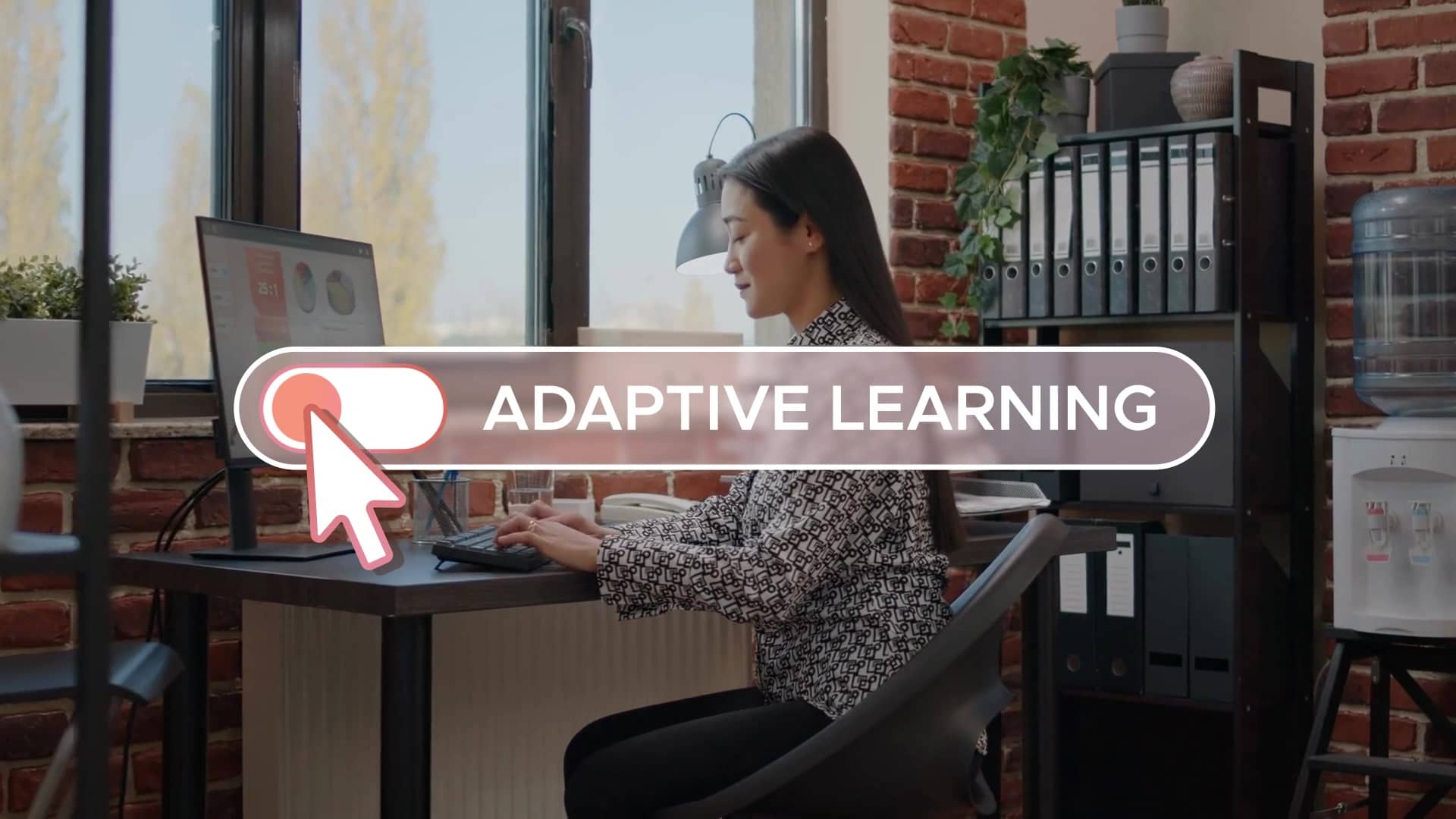
14 May 2022
This was the title of a recent webinar on adaptive learning, conducted by Rise Up in conjunction with HR analysts Fosway Group. Michael Strawbridge, global head of community at the Learning and Performance Institute, chaired the webinar, with Marie Redor, head of product at Rise Up and Fiona Leteney, senior analyst at Fosway Group, forming the panel.

14 May 2022
The pandemic and its consequences – travel restrictions, lockdowns and the shift to remote working – have led to the exponential digitalisation of work and professional training. Beyond that, the pandemic has led to a paradigm shift, forcing us to take a step back and reflect on how we run our economies and societies. As a result, we have come to realise the importance of human connections.

14 May 2022
The Covid-19 pandemic has been completely unprecedented, meaning that we’ve had no points of reference to help us make sense of what has unfolded. Many sectors, such as retail and hospitality, struggled during the successive lockdowns in the UK and had to either make their employees redundant or put them on furlough. And as the pandemic has dragged on, the wider economy has taken a hit, with many companies being forced to shut down completely.

14 May 2022
Ever wondered what skills training managers will need in the future? We heard from Stéphane Diebold, head of the training association AFFEN, during a conference held at the SRH E-learning Expo. Having worked as an executive within dozens of companies, Stéphane established AFFEN, which he describes as the first think tank and “do tank” for training managers. Passionate about all things training, he touched on some key skills that trainers will need to remain relevant in the future. Rise Up was there. Here are some of our key takeaways from the session.

14 May 2022
It’s clear that the pandemic and the resulting lockdowns have accelerated the digitalisation of training. In no time at all, professional training methods have been completely transformed. Delivering traditional in-person training has been made much more difficult. Companies are being forced to look towards digital learning methods, based on e-learning or blended learning.

14 May 2022
Do you find millennials a difficult generation to train? We’ll provide you with some key pointers for how to engage them, including working in groups, freedom of expression, visual communication and learning by experience.

13 May 2022
The world of work is set to undergo a global reskilling revolution. That’s according to analysis conducted by the World Economic Forum, which has claimed that almost one third of all jobs worldwide will be transformed by technology in 2030. As jobs evolve, so will the skills required to perform them. Reskilling workforces will therefore be crucial to ensure that employees have the skills they need to perform the jobs of the future and fulfil their potential.

12 May 2022
According to a report published by the ONS, there were a record 1.2 million job vacancies in the three months to November 2021 in the UK, with businesses struggling to fill posts. The main reasons for this were a low number of applications and a lack of qualified applicants – indicating an economy-wide, national skills shortage.

12 May 2022
Have you ever struggled to find the right person for a role, no matter how hard you tried to advertise the job and provide a generous rewards package? You’re not alone. According to a report published by the Open University, more than two-thirds of employers have struggled to recruit workers with the right skills. And this skills gap costs organisations an eye-watering £4.4 billion in recruitment fees, temporary staffing and increased salaries.

12 May 2022
You’ve probably heard about hard and soft skills. The first refer to measurable talents and abilities – such as being able to create a graph using Excel – while the second refer to subjective skills that are more difficult to quantify, such as performing well under pressure.

12 May 2022
The retail sector has experienced unprecedented upheavals over the past couple of years. Successive lockdowns during the pandemic, compounded by the supply chain issues brought about by Brexit, have had an adverse effect on the sector’s sales and profits, leading to redundancies and causing many workers to leave the sector.

11 May 2022
Is your business looking for high-quality online training content? Are you looking to create a catalogue of e-learning modules that meet your employees’ needs? These questions are becoming increasingly pertinent amidst the ongoing changes to the worlds of work and training. Luckily, off-the-shelf content delivered via LMS can help to address many of the issues companies face and enable employees to gain new skills.

11 May 2022
Not quite sure what off-the-shelf courses can offer your business? Or are you struggling to choose between the thousands of modules available on your LMS? In this article, the Rise Up team will walk you through the kinds of skills your employees can gain thanks to off-the-shelf training content.

11 May 2022
Businesses across the globe are all looking for ways to upskill their employees quickly and effectively. Putting together a bank of training materials is key to this. To make things easier for you, we’ve created Rise Up Content: a catalogue of e-learning modules in a variety of engaging formats that you can use straight away. In this guide, we’ll highlight six of our favourite off-the-shelf content formats that your team will love.

11 May 2022
When planning out training courses for your learners, a few elements are as important as the content itself. However, it can be difficult to choose between off-the-shelf content, which is ready to use as is, and bespoke content, which your organisation either designs itself or commissions.

03 May 2022
3rd May 2022 - Rise Up, the fast-growing employee learning software solution, has raised €30M with Connected Capital, a leading B2B SaaS-focused investment fund, its previous investor MAIF Avenir and its first shareholder Impact Partners. This second round of investment funding for the scale-up will further advance the company’s European growth, allowing the further expansion of the commercial organization and product suite as well as localization of its learning and development solutions for European markets. Rise Up Co-Founder & CEO Arnaud Blachon explains, “As we continue to navigate the COVID-19 pandemic, hybrid learning is fundamental; Rise Up offers an inclusive learning platform that transforms this crucial business challenge into an opportunity for our customers. Our partnership with Connected Capital, with its focus on B2B SaaS, and their experience with HR tech companies in particular, will allow us to further strengthen our position in local European markets.” Today, learning is one of the most fundamental business challenges and is top of mind for both CEOs and employees. 79% of CEOs worldwide identify the lack of essential skills in their workforce as a threat to future growth (PWC), and the inability to learn and grow is the #1 reason for employees to look for a new job (Bersin and LinkedIn). “Learning software solutions are increasingly relevant for organizations and Rise Up’s ability to serve customers with complex learning requirements – different user groups, (blended) learning formats, multiple entities and countries within one organization – differentiates them as the one learning solution easily accessible across the full organization,” added Sander Pennings of Connected Capital. “Rise Up’s rich product suite combining LMS, LXP and content authoring is already adding crucial value to companies ranging from SMEs to large corporations such as Axa, Schneider Electric, and Domino’s. We are impressed with Rise Up’s efficient growth over the last years in its current markets and are excited to contribute to the company’s accelerated international expansion.” Success Story: Integrated, Adaptive Learning with Stellar Customer Experience Rise Up has roughly doubled both its revenues and staff every year since its creation in 2014. Today, its one-stop-shop learning solution, combining LMS, LXP, LRS, LCMS, mobile and multimodal services, serves over 400 customers and 1 million active learners in 60 countries. The reputation of Rise Up is based on ease-of-use, for both learners and administrators; easy product configuration, allowing customers to mirror their organizational structure in the platform; innovative technology, harnessing both Artificial Intelligence and Machine Learning; simple integration, with existing HR and business systems; and exceptional customer support. The human-first, AI-driven software solution offers each individual a personalized, adaptive approach to learning. Unique features, including an intuitive blended learning environment, a motivational chatbot, and a Microsoft Teams integration, render the overall learning experience both positive and engaging. In addition, Rise Up creates a positive social impact in local communities, expanding access to training by offering its platform to beneficiary associations and developing youth employment through both apprenticeships and professional immersions. The Learning Industry: Full of Potential The global learning and development industry will reach $402 billion by 2022 (Beroe Inc) and the European market is expected to grow in the mid-single digits annually over the next 3-5 years. With offices in Paris, London, Brussels, Amsterdam, Lisbon, and Munich, Rise Up has begun to build a solid network across Europe, and the tech scale-up is targeting high growth in these markets. Rise Up was named a Core Challenger by the Fosway Group in its 9-Grid™ for Learning Systems, and an Accredited Learning Technologies Provider by The Learning and Performance Institute (LPI). Recognizing its growth, Rise Up was named to the Recrutement 2022 Palmares by Le Figaro as well as the TECH500 by Data Recruitment. Prior to this Series B investment round, Rise Up raised less than 5 million euros since its launch in Paris in 2014. The company secured initial seed funding in 2018 from several investors, including Impact Partenaires, Bpifrance and BNP Paribas, and secured its first round of investment funding in 2020 with MAIF Avenir, IMPACT Partners and Bpifrance. In 2021, Rise Up signed a strategic partnership and equity investment with Ifpass. Additional financial details will not be disclosed.

03 May 2022
Skills as currency. That’s an expression that is being used a lot at the moment in L&D and business circles. But it’s not actually a new concept – it’s something that L&D was talking about 15/20 years ago, usually in relation to IT skills. However, it’s resurfaced the past couple of years and for very good reason. Skills – or more accurately, a lack of them - is a very topical issue right now.

02 May 2022
An e-learning course is only effective if the majority of learners who enrol on it actually see it through to completion – yet retaining learners’ attention and keeping them actively engaged is notoriously more difficult with a distance learning course. Studying alone and having to deal with unwanted distractions (whether at work or at home) are just two reasons why learners tend to abandon distance learning courses before completing them.

02 May 2022
It goes without saying that adhering to a well-defined methodology is crucial when it comes to designing a blended learning course. The first step is understanding how teaching theory can help you to develop your employees’ skills. Next, it’s a case of analysing your organisation’s structure to determine your target learners and teaching objectives. After that, you can move on to the design phase, where you can reflect on the teaching strategy you plan to implement.

02 May 2022
Rolling out a range of digital training courses can often prove tricky, especially for the first time. However, provided that you’re well prepared and organised, digitalising your training courses with a blended learning approach doesn’t have to be difficult.

02 May 2022
According to a report published on Statista in 2021, digital learning is set to become one of the most important ways that people in the UK teach and learn new skills in the 2020s, with the pandemic having acted as a catalyst for the sector’s growth.

02 May 2022
Recent years have seen major shifts in the way training is conducted in the workplace. E-learning has been a huge part of this, and is being used to simplify the process of managing training programmes as well as to help employees gain the skills they need in order for the business to remain competitive.

28 April 2022
Today, the world of professional training relies increasingly on two approaches: adaptive learning and digital learning. Already growing in popularity before the pandemic, both of them have seen explosive growth as more and more of us begin working from home.

28 April 2022
In recent years, adaptive learning has taken an increasingly prominent role in the sphere of professional training. However, businesses need to be ready to take certain steps to get the most out of what is an undeniably promising tool. In this article, we’ll shed light on what adaptive learning has to offer, as well the challenges it faces as a result of ever-changing employee expectations with regards to training programmes.

28 April 2022
After a turbulent few years, many of us have changed the way in which we work. The kitchen table is taking the place of the traditional office, and today’s employees are often either working solely from home or in a hybrid arrangement. To meet the needs of a more mobile workforce, professional training is having to adapt. One solution that is growing in popularity is adaptive learning.

28 April 2022
Your business depends on what your staff are able to do. For your organisation to perform at its best, therefore, proper training is indispensable. Prioritising this is even more important as we see the emergence of an increasingly mobile workforce and the rise of new sectors.

28 April 2022
Any e-learning software worth its salt in today’s market will include at least some form of adaptive learning system. It’s not hard to see why. Organisations the world over have turned to the technology to help improve their training programmes, as well as to save time and money. But do you know all of the pros and cons of adaptive learning?

28 April 2022
The goal of adaptive learning is to meet the needs of every learner. It’s an approach that has become increasingly successful in recent years—but how does it work? How can you introduce adaptive learning in your own business? And how can you roll out an adaptive learning course on an LMS platform? You can find the answers to all of these questions right here!

28 April 2022
Adaptive learning and machine learning are two distinct, yet closely related concepts within the field of vocational training. In this article, we’ll show you the ins and outs of these two systems, both of which have their roots in artificial intelligence.

28 April 2022
When it comes to training, today’s workforce is looking for greater personalisation and flexibility. Both adaptive learning and mobile learning help to meet these needs—and there are benefits for companies who choose to implement them. In this article, we’ll show you how using mobile learning together with the right adaptive learning software can make your training programs more effective.

28 April 2022
Adaptive learning is now present in more businesses than ever before. It’s easy to see why its popularity has grown: organisations are looking to optimise their training programmes and to help their staff gain new skills more quickly. Adaptive learning fits the bill perfectly, using artificial intelligence to provide personalised courses for each employee.
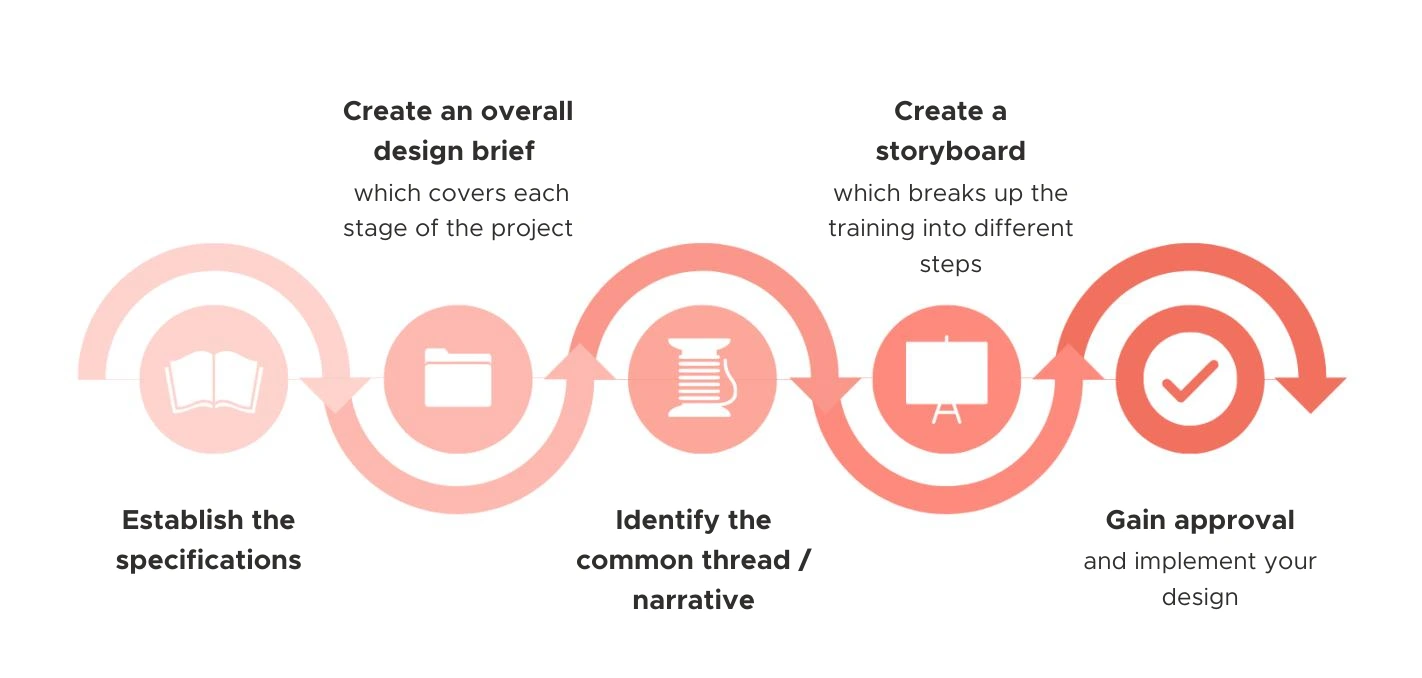
16 April 2022
When designing a blended learning course, you need to have a solid methodology. And having a methodology implies having several steps that you follow carefully – from determining the scope of the training and having it audited internally and externally to designing, creating, rolling out and assessing the course.

16 April 2022
Blended learning is a hybrid training method which aims to make training as impactful as possible by combining in-person learning (which offers human contact, practical exercises and hands-on experience) with e-learning (with its accessibility, reduced cost, time saving potential and ability to monitor learner progress), while also making use of the different teaching methods available through digital learning (social learning, mentoring, mobile learning).

16 April 2022
Over the past few years, blended learning has become increasingly popular among trainers and learners – and for good reason. It arguably represents the best of both worlds, drawing on the benefits of both online and in-person training methods, and enables learners to upskill more quickly.

16 April 2022
Designing a blended learning course is good – and designing one that your employees will take is even better! But if you don’t want your training course to be overlooked – and don’t want all that time you spent developing it to go to waste – you need to ensure that you roll it out and promote it effectively. But don’t worry: rolling out your blended learning course couldn’t be easier with a learning management system (LMS).

16 April 2022
You’ve no doubt heard about blended learning – a hybrid learning method that combines in-person classes with digital training via e-learning modules and even virtual classes. But you might find that creating a blended learning course from scratch is pretty challenging, and you might not know how to go about it or where to start. The key to designing a great blended learning course is having a rigorous methodology combined with the right tools. That’s where Rise Up comes in! As blended learning experts, we can guide you through the development of your blended learning course, step by step!

30 March 2022
This is the last post in our series of articles on learning culture, but it’s by no means the least important one. In a learning culture, skills are a top, strategic priority. They are assessed, worked on and renewed all the time, with everyone taking responsibility for skills – learning teams, senior leaders and employees. But, what’s the current situation with regards to skills in the UK?

27 March 2022
In times of significant change, with huge challenges put upon the retail sector in recent years, it's no wonder some companies and employees are ending up burnt out and disengaged. Now is the time to recognise this change and put steps in place to reengage the workforce, supporting the development of a resilient team. Resilience, often an overlooked quality, is essential in ensuring employees can cope (and thrive) when times are tough.

28 February 2022
This is the third article in our series on learning culture. This article talks about the importance of employee engagement and a positive employee experience and how they relate to a strong learning culture. To see the previous two posts, visit: Building a learning culture – an interview with DR Nigel Paine and What is a learning culture?

25 February 2022
A skills development plan is a must-have for any business looking to help its employees maximise their potential. After all, the success of any organisation is predicated on the abilities of its staff. By helping them to grow, you’re also investing in the future of your company.

24 February 2022
Nowadays, it’s almost impossible to imagine training your employees without using some kind of online platform. To help ensure the best possible results, many companies have already turned to learning experience platforms (LXPs), while others are still considering making the switch.

24 February 2022
A learning experience platform (LXP) is a game-changer for any company looking to increase employee engagement with training courses. What’s so great about LXPs? Well, for starters, they give you access to a range of high-quality teaching methods that are proven to boost participation and foster new skills.

24 February 2022
Plenty of questions still surround the way we, as humans, learn new skills. There’s no doubt, however, that our interactions with others play a key role in this process. This principle lies at the heart of how learning experience platforms (LXPs) work.

24 February 2022
Decided to wave goodbye to traditional training methods and step into the future with digitised training? There are two software options available: a Learning Management System (LMS) or a Learning Experience Platform (LXP). But which is best suited for your organisation?

24 February 2022
There are plenty of reasons why you might be interested in investing in a learning experience platform (LXP). Perhaps you’ve noticed that your existing LMS isn’t quite cutting it anymore—or maybe you’ve still been organising all of your training the old-fashioned way, and want to try something new. No matter what your reasons, there are some key features you need to look for in an LXP.

24 February 2022
As the world of work changes, training software needs to evolve with it. Learning experience platforms are no different, and need to keep up with the times. So, what makes a great LXP in 2022?

24 February 2022
Learning experience platforms (LXPs) are popular amongst companies looking to provide their employees with state-of-the-art training. LXPs put the learner at the heart of their own training pathway, helping to increase their motivation and sense of engagement.
.webp)
24 February 2022
A learning experience platform (or LXP) is an invaluable tool to have at your disposal throughout the process of training your employees. That’s why it pays to know more about what an LXP can offer. So, whether you’ve only just heard of the term or are already planning to acquire one for your business, this is the guide for you.

23 February 2022
LXP software is widely used by all kinds of businesses for their training needs. However, you might not be totally familiar with the possibilities offered by LXPs—or, to give them their full title, learning experience platforms.

07 February 2022
This is the second article in our series on learning culture. To see the previous post, visit: What is a learning culture? Dr Nigel Paine, learning and leadership expert, international speaker and author of several books, talks to Rise Up about how to build a learning culture. In particular, he discusses four key elements that he says need to be in place in order for a learning culture to flourish: empowerment, trust, engagement and leadership.

01 February 2022

20 January 2022
The world of work has been irrevocably altered by the pandemic, and new solutions are required to meet the needs of today’s businesses. At Rise Up, we specialise in blended learning solutions, and have long had to take into consideration the balance between office-based and remote working. Thanks to our platform’s unique set of advantages, we are able to support L&D leaders in overcoming their learning challenges.

03 January 2022
A lot of research has been conducted recently into the make-up of the modern workplace and it all says the same thing: that post-pandemic, most organisations will continue to offer a blend of office and remote working. However, even though business leaders know the future is hybrid, surprisingly few are actively preparing for it.
%20(1).jpg)
27 December 2021
Nowadays, it’s not enough to implement just one type of learning method into your training programs. Instead, training programs need to incorporate as many learning methods as possible—from e-learning and face-to-face learning to virtual learning and social learning to ensure learners can efficiently build up a robust set of skills and knowledge.

13 December 2021
When deciding whether to invest in new software, cost is one of the most significant aspects to consider. However, this isn’t a simple case of comparing price tags. Each programme will have a unique set of features which need to be taken into account. So, when you’re asking yourself about LMS costs, you need to weigh up your spend against the potential benefits to your business.
.jpg)
07 December 2021
Nowadays, more companies than ever are turning to learning management systems (LMS) to manage and digitise their training. From large businesses to SMEs, companies far and wide are turning to LMSs en masse to train their employees. However, the process isn’t totally smooth for everyone. You might be struggling with outdated tech, using a platform that doesn’t encourage learner engagement, or just reluctant to leave the old-fashioned way behind.

30 November 2021
As more companies come to understand the importance of learning and development to business performance, an aspect that can be hard to master is employee engagement. It’s all well and good to have a training solution in place, but if your workforce does not effectively interact with the material, they are unlikely to benefit. To make the most of your investment, you must ensure that employees are motivated to successfully participate in any training you provide.
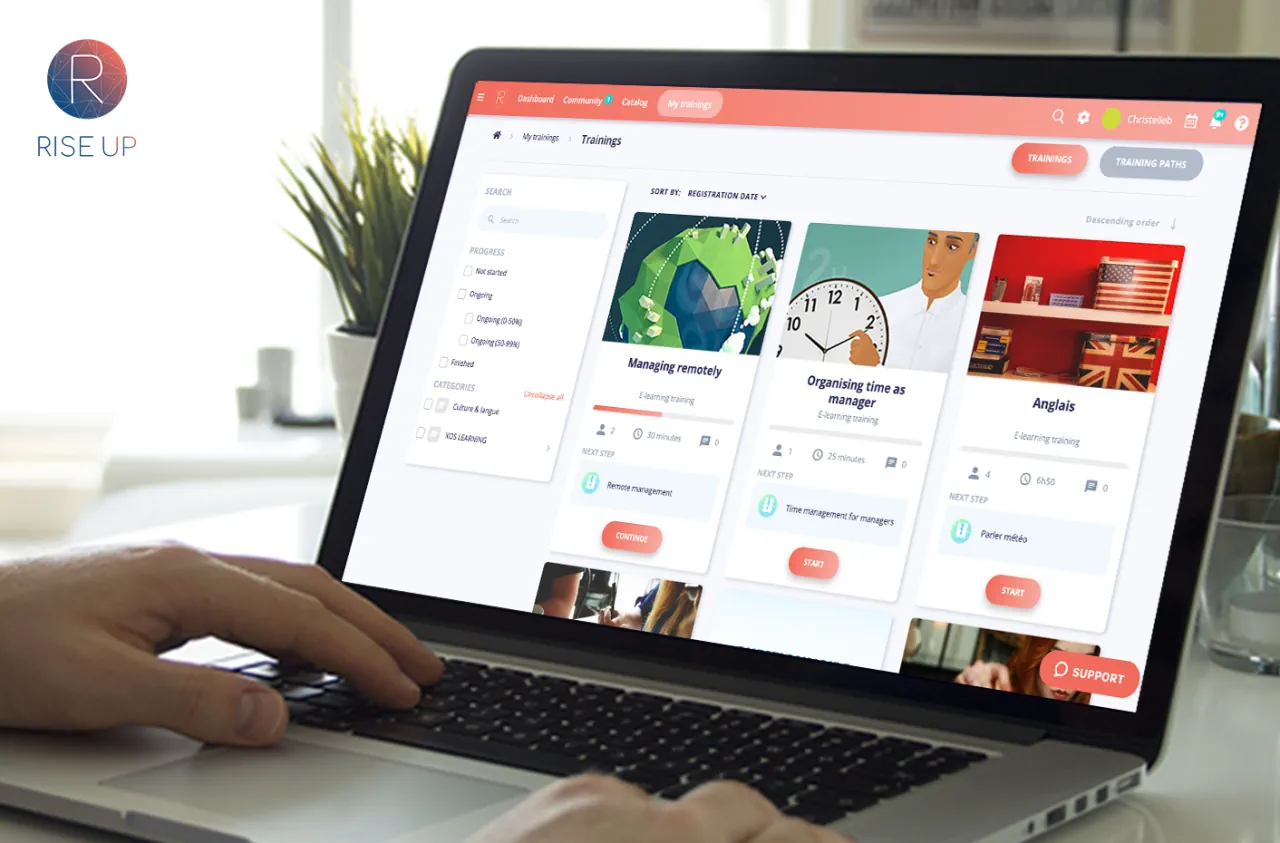
20 November 2021
A few years ago, many of us may have been unfamiliar with learning management platforms. Since the start of the COVID-19 pandemic, though, e-learning has become part and parcel of working life like never before. Even companies whose staff are back in the office have recognised the continued benefits of blended learning, and it’s clear that the approach is here to stay.

11 November 2021
Halfway between face-to-face and digital training, Blended Learning is revolutionising tomorrow's learning! Definition and example of a tried and tested method.

03 November 2021
When it comes to training programmes, it’s absolutely essential that you provide an engaging learning experience that will actually improve the skill development and performance of your employees. The best way to do this is by picking a learning management system (LMS) that provides a range of learning methods that you can adapt to suit your learners and training objectives.

28 October 2021
Today’s businesses have no shortage of training methods to choose from. Amongst these, learning management systems, or LMSs, are ahead of the pack. However, things can get tricky when it comes to choosing between different LMS platforms. We’re here to help make the process simpler by showing you 7 things you need to know before choosing an LMS platform.

28 October 2021
Interactive learning is an approach to training where learners are encouraged to actively engage with the trainer, the material and each other.

25 October 2021
If you’re a training provider, or a business aiming to help your employees gain new skills, you’ll probably have heard of the term learning management system (LMS). An LMS is a versatile and powerful tool that gives you the ability to manage training, digitise courses and track progress at every step.

20 October 2021
For businesses big and small, finding a training approach that addresses all company requirements can be tricky. Choosing to use a learning management system (LMS) for your training needs allows you to offer the same high quality teaching to all of your company’s employees—and that’s just one of many advantages! In this article we’re going to provide 7 great reasons to invest in an LMS for your company.

22 August 2021
Social learning is a new learning method based on exchange between participants! Discover 10 tips to implement it or improve it and get the best out of your employees' skills.!

11 July 2021
Learners are often required to complete a Blended Learning path quickly to respond as fast as possible to the needs of the learners. But what is the best choice in the end? There's no point in implementing an extensive blended learning course if you miss the right time for setting it up. We all would like to see our blended learning training succeed. We want this to benefit the employees, the organisation, the trainees in our training courses and to create an example of a successful project. We repeatedly read that blended learning is the future of training; therefore, we intuitively feel it is part of the solution. The challenge is to offer training courses that combine e-learning with more experiential human interactions.

11 June 2021
And if we were interested in why Blended Learning! This is an essential step before setting up any training project. Discover the advantages of combining digital and face-to-face training.

16 May 2021
Extended enterprise and learning? Most organizations forget to train their partners who are an integral part of their ecosystem. The LMS platforms allow to answer this problem.

25 April 2021
Every year new professions appear and the training sector is no exception! We are interested here in four functions: community animator, "field" trainer, digital learning manager and digital content designer.

11 March 2021
It's not just a matter of luck! Several pitfalls when setting up training projects are to be avoided. Among them, lack of coordination, contradictory opinions, uninteresting content. In addition to these pitfalls, there are also tips to follow!

09 March 2021
Putting together effective e-learning content can be thought of as a science, or perhaps a fine art. You might think it’s a simple matter of compiling the information you want to convey and distributing it to your learners. However, you could risk creating a course that isn’t engaging enough, or that simply isn’t fit for purpose.

11 February 2021
You might have heard about blended learning: professional training experts rave about it, and it has featured on the agenda of every digital transformation conference for some time. But, what does blended learning actually mean? Want to know what all the hype’s about and the answers to the question, what is blended learning? We’ve produced a handy infographic to help explain.

11 February 2021
We propose 4 steps to set up the skills plan: definition of objectives, skills assessment, inventory of available resources and communication.

11 February 2021
Blended learning focuses on the learner's experience by combining face-to-face training and e-learning.

28 January 2021
What makes a successful e-learning module? It needs to be well-defined, well-written and well-executed. Find out more below!

12 November 2020
It's hard to miss the MOOC trend that has developed in recent years, to the point of flooding free training platforms. Thanks to MOOCs, everyone can train freely and for free, and even receive certification. But then... What do the new terms COOC and SPOC mean?

12 November 2020
The skills development plan... Everybody talks about it but nobody really knows how it works! Here are 5 valuable tips to build an efficient and profitable plan for your business.

12 November 2020
E-learning has now been around for decades, but plenty of misconceptions still surround it. As an LMS provider, we hear these opinions from decision makers and stakeholders all the time, and we decided it was time to set the record straight. In this article, we’ll take a look at some common beliefs concerning e-learning, and examine whether there’s any truth to them.

11 November 2020
IDD stands for "Insurance Distribution Directive". It is a European directive in force since 2016, whose ordinance and decrees were published in France in May and June 2018. The IDD effectively repeals the Insurance Intermediary Directive (also known as IMD1).
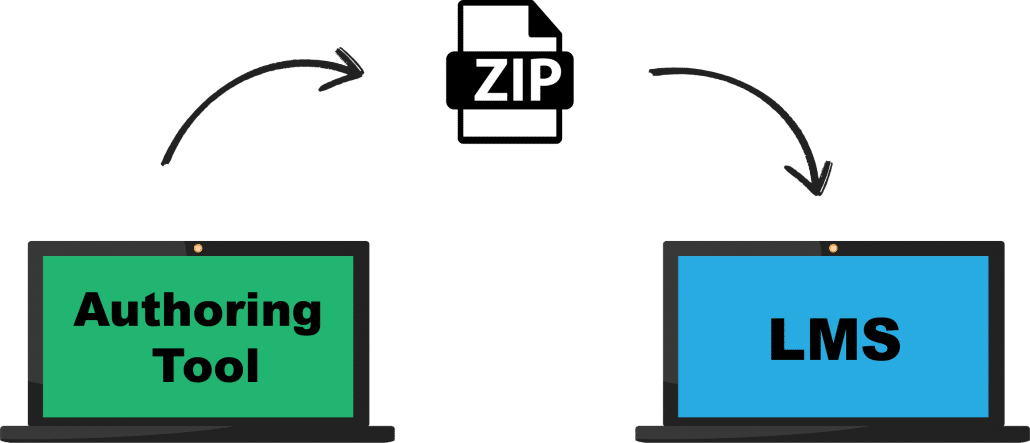
10 November 2020
SCORM is an international standard for the creation of e-learning modules. It combines two things:

08 November 2020
Virtual classroom: a good support but what are the steps to set up. We propose 6 of them, from logistics to communication: choice of themes and tools, training, content, optimisation and information.

06 November 2020
The virtual classroom is not a new medium but it remains an asset in your training courses. Among the advantages: flexibility, proximity and accessibility.

05 November 2020
Schneider Electric, a French company providing energy and automation solutions, were looking for a way to provide thousands of customers with face-to-face training and e-learning sessions without having to use multiple training tools and applications. They found the answer to their problem in Rise Up, an intuitive, powerful LMS platform. By giving them the ability to extend their lessons beyond the classroom with a virtual city, Rise Up has taken Schneider Electric’s training and customer experience to the next level.

05 November 2020
Mobile learning combines with various trends for optimal training: augmented reality, geolocation and coaching. It is a good way to personalize the experience of your learners.

04 November 2020
It seems astonishing at the time of digitalization to continue to promote face-to-face. However, face-to-face reinforces digital. Blended learning is the winning combo for effective learning.

04 November 2020
It is not always easy to know what actions to put in place in order to make one's training known to everyone... Prospecting, natural referencing via social networks, discover all our advice to bring your e-learning projects to light!

03 November 2020
At a breakfast organized by the SRH trade show, Michel Diaz, Associate Director of Féfaur, spoke on November 29th about digital learning trends. Partner of the exhibition, Fefaur is a company specializing in e-learning consulting and strategies. Michel Diaz is also editor-in-chief of the E-learning Letter website, the reference media on digital learning in France. As a popular speaker, he regularly speaks in France and abroad to share his expertise. Here is what we learned from this conference.

03 November 2020
Interested in giving e-learning a try, but unsure where to start? Don’t miss out! By getting to grips with digital training platforms, you can unlock countless benefits. Check out our guide on moving from face-to-face training to e-learning!

03 November 2020
The Learning Management System, or LMS, has been constantly evolving over the last ten years or so, in order to adapt to the new changes in professional training. Arnaud Blachon, CEO of Rise Up, speaks in this interview and discusses how the LMS is constantly adapting to the training issues of companies and training organisations..

03 November 2020
Numerous professions are being created as a result of the emergence of digital training in the world of professional apprenticeship. Focus on 4 professions of the future!

02 November 2020
Digital technology has changed the game when it comes to workplace training. While some employers are happy to jump in head first and adopt e-learning programmes, others are more sceptical, or simply need more information. If you fall into the latter category, then we have just the guide for you.

09 September 2020
As beneficial as face-to-face training can be for the development of key skills and knowledge, the costs associated with it can be astronomical. Switching to e-learning, or a blended learning approach, however, can bring those costs down significantly.

28 July 2020
Choosing an e-learning support is good, but anticipating is better. It is essential to explain this choice to employees and train them in this new tool to accelerate its adoption.

23 June 2020
Press release. June 22, 2020. Blended learning specialist Rise Up raises €5 million to accelerate its commercial development and international expansion.

01 April 2020
Gamification is a good way to increase your learners' engagement in your Blended Learning. It brings a social aspect and a willingness to challenge oneself.

05 March 2020
Blended Learning can help you ensure good onboarding. Welcoming a new employee in good conditions is essential. Don't hesitate to create a dedicated training course when they arrive.

11 February 2020
The training action in work situations, AFEST, is the new subject to be taken into account in 2019. Blended Learning is perfectly adapted to this obligation. Objective, involvement and autonomy are our key words.

20 January 2020
SSO here, SSO there... you often hear this term but the definition is still a bit confusing? This article is made for you!

06 January 2019
Educational technology is constantly evolving. In its infancy, e-learning typically took the form of simple online modules that learners would complete one by one. Recently, however, an explosion of new formats and methods has seen the face of e-learning change dramatically. Some of the top advances in this field are continuations of long-term developments, while others represent new innovations. Let’s take a look at six of the most interesting e-learning trends of 2022.
.jpg)
10 January 2018
2018 trends: one more! January is currently a time of "happy new year" and "best wishes" and articles presenting 2018 trends for training are multiplying. That is why, to be original, we will address some topics to follow and monitor for this coming year.



